› Forums › 2023 Winter Courses › GCSEWriting-Mon(China)
- This topic has 92 replies, 10 voices, and was last updated September 4, 2024 by
Beth.
-
AuthorPosts
-
-
at 12:32 #37811
Beth
ParticipantSummary for Lesson 1
In today’s class we began with our literary analysis course, thinking about the key concepts needed to fully get under the layers of literature. We began with a fantastic discussion of what we are looking for when we analyse literature, digging under the surface of the text to understand what the author wants us to see in their worldview. We completed a picture task to demonstrate the difference between summary and analysis before completing some close textual analysis on a passage from George Orwell, with which the students were wonderfully perceptive. We thought about the use of language, techniques, structure and connotations and how we can weave these ideas together to create wider arguments about the author’s purpose and ways of thinking. Fantastic work today everyone, well done for your excellent analyses of colour imagery, similes and perspective. I look forward to seeing you all next week, keep up the great work 🙂
Here is the link for the homework paper, remember you are only answering Question 4. The passage is on page 22 of the PDF:
https://revisionworld.com/sites/revisionworld.com/files/imce/1EN0_01_que_20201103.pdf
Homework
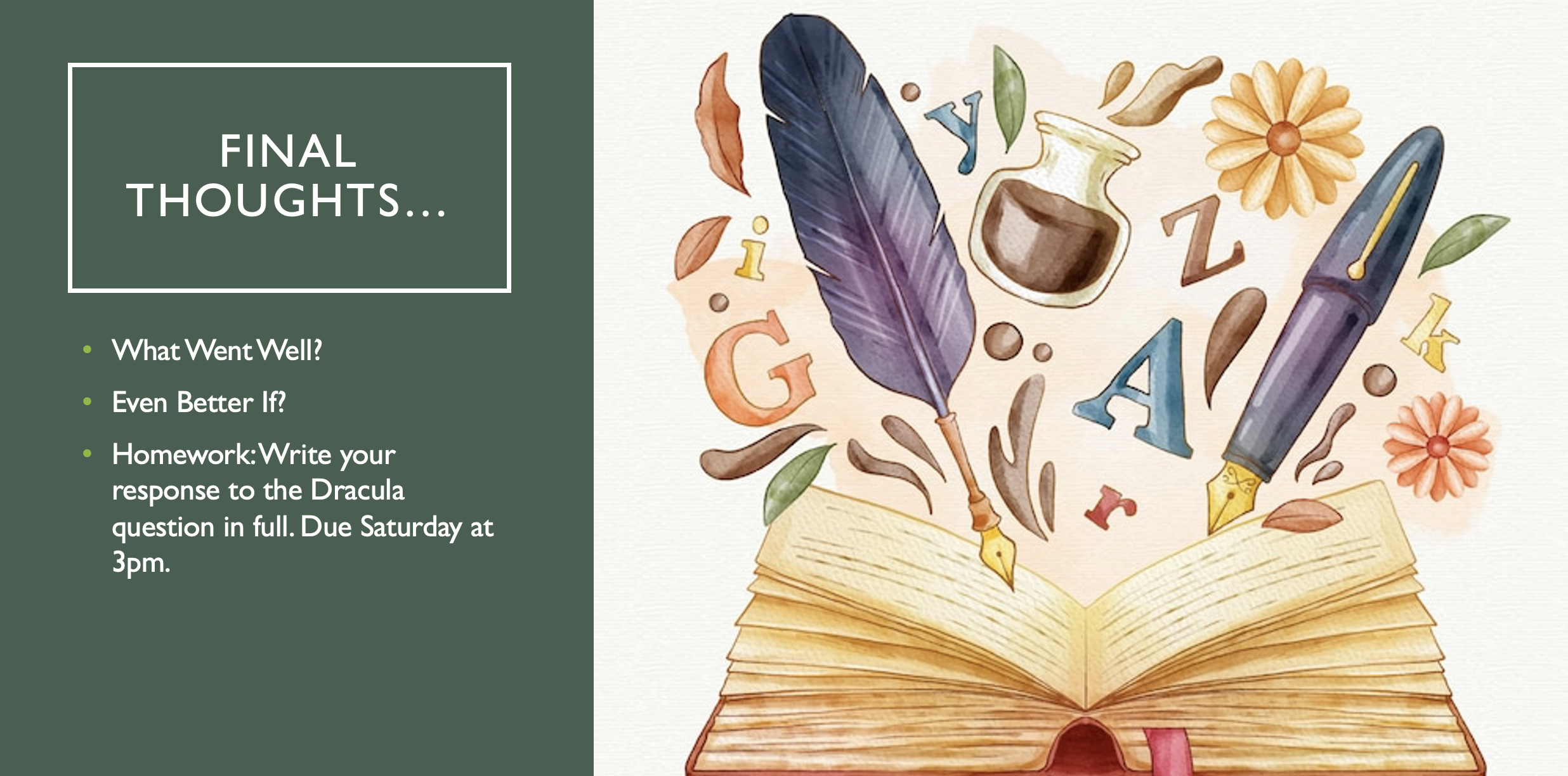
Attachments:
You must be logged in to view attached files. -
at 14:39 #37938
Kiki
ParticipantWriting course homework
in this extract there is an attempt to create an atmosphere of suspense. evaluate how successfully this is achieved. Support your views with detail reference to the text.
In this extract from ‘Dracula’ written by Bram Stoker, the atmosphere of suspense is created successfully.
Stoker intends on creating suspense by using the Count’s hand as a clue. Examples of this could be the start of the passage, where the count “motioned his hands as if he were washing them”. The count might be trying to convey a message to the storyteller and judging from the count’s previous threats it might be something terrible. But this message is unknown, which creates suspense for the reader. Another example is where the main character saw the count hands that helps him crawl out of the window, the main character confessed that “in any case I could not mistake the hands which I had had so many opportunities of studying”. The intentional emphasize on the count’s hands might forbode future horrors that is unknown in this point of the story, which also creates suspense for the reader.
Another method that Stoker used to create suspense is contrast between what the reader expects and what is described. The author started the expert with the count’s threats of how dangerous the castle is, then describes the scenery that the main character saw upon looking outside the window. Everything is “almost as light as day”, even the darkness is “velvety”, and “in the soft light the distant hills became melted”. This peaceful and gorgeous scenery have a huge contrast with the castle described by the count. This might make the reader feel suspense, since the real nature of the castle is unknown, all the beauty of the castle might just be an imagination woven by the main character. Afterwards in the excerpt something bad did happen, for the main character saw the count crawl out of his window. Another example is the change of the main character’s feeling from when the main character was enjoying the fake beauty of the castle to him discovering the presence of the Count. The main character’s feeling converted from being “interested and somewhat amuse” to feeling “repulsion and terror”. To be interesting and amused in a creepy castle might forbode bad things happening in the future, while the sudden change of feeling will make the reader wonder what has occurred, therefore creating suspense.
Thirdly, Stoker uses a cliffhanger to create suspense for the reader. In the end of this excerpt, upon seeing the old Count crawling out of the window into the abyss like a lizard, the main character was scared and exclaimed in fear “what manner of man is this, or what manner of creature is it in the semblance of man?” this statement was more of an expression of fear rather than a question but could make the readers wonder the same thing. The fear was not unleashed in this excerpt nor was the question answered, henceforth, creating suspense. Another example is the end of the extract where the main character confessed that his fear “encompassed” him and that the future horrors are things that “he dares not think of….”. the use of the word “encompassed” shows how he feel thoroughly surrounded in fear, and the real secret of the castle was not unveiled, but represented by “….”, creating suspense for the reader.
Using various methods such as the clue of the Count’s hand, the contrast between what the reader expects and what is describes, and the cliffhanger at the end. The excerpt is successful in creating suspense.
-
at 08:16 #38062
-
-
at 04:52 #37954
Jonathan
ParticipantLesson 1 Homework
In the extract from Dracula by Bram Stoker, the author successfully creates an atmosphere of suspense, with various compelling language choices.
The extract begins with Dracula’s speech with a whimsical tone. For instance, it reads, “Be warned! Should sleep now or ever overcome you, then haste to your own chamber or to these rooms, for your rest will then be safe. But if you be not careful in this respect, then”. The old-fashioned speaking style naturally gives the reader a sense of mysteriousness. Meanwhile, words such as “Be warned!”, “overcome”, or “haste” all serves for the purpose of intimidation and enforcement, which builds up the horror further. The sudden pause at the end of the speech is frightening. Silently informing the narrator the consequences, Dracula threatens him to leave. To this moment, the setting leaves a strong impression to the reader: the castle appears to be haunted by the sinister Dracula.
Moving on to the next paragraph, sensory details are sufficiently used to emphasize the suspense ongoing in the castle. It starts with a description of the narrator’s internal fear. An example would be “I felt that I was indeed in prison”, metaphorically giving a feeling of claustrophobia, which also foreshadows the upcoming plot. Also, the narrator mentions how he wants “a breath of fresh air”, suggesting a suffocating feeling in the castle. Similarly, the description of “It is destroying my nerve” implies the scary surroundings are causing the narrator’s anxiety. Suddenly, this terrifying sensory description is transitioned to the beautiful scenery outside of the castle. The huge contrast depicts a bizarreness of the haunted castle seeming to be separated from the outside world. Moreover, there are hidden information conveyed in the description of the natural scenery. For example, descriptions such as “melted” and “velvety blackness” sets a blurry, mysterious sensation, increasing the feel of uncertainty. The sensory details, combined with the contrast of setting, eventually intensifies the suspense.
As Dracula finally makes an appearance, the suspense has reached its peak. Dracula slowly craws in an eerie manner. He craws “with his cloak spreading out around him like great wings”. The author uses imagery to show the unnatural and strange characteristic of Dracula. The way Dracula moves is described as how “a lizard moves along a wall”. At first, the narrator is amused by the strange creature Dracula, but as he observes it closely, he is shocked and terrified by the scene in front of him. Dracula is looking bizarre, something the narrator has never seen before. Facing this mysterious beast, the sense of horror is at the maximum. Finally, in the ending, the feeling of claustrophobia is stressed again. Words like “overpowering”, “no escape”, “encompassed” implicates the atmosphere of horror and suspense is taking the narrator’s breath away. The narrator explicitly states his fear of this castle. The story abruptly ends here, leaving a cliffhanger for the reader to wonder about what will happen to the narrator in this haunted castle. The suspense is raised up once again.
To summarize, the extract from Dracula uses multiple language choices, including tone, sensory details, imagery, metaphor, contrast, etc. to successfully construct the atmosphere of suspense. The castle and Dracula have been portrayed bizarrely, with the story plot intensifying more and more in each scene. The vivid narration gives the reader goosebumps while reading the suspenseful descriptions of the scenes.
-
at 08:24 #38064
-
-
at 09:40 #37957
flower
ParticipantGCSE Lesson 1 Homework
In the extract from Dracula, the author Bram Stoker successfully constructed an atmosphere of tension and horror, which created suspense.
Firstly, the atmosphere Stoker created overall is depressing. For example, the narrator mentioned: “I felt that I was indeed in prison, and I seemed to want a breath of fresh air, though it were of the night.” When a person craves air——common sense is that in normal conditions, we have enough air———it is not a physical lack of air, but a mental craving for an opening, a craving to escape a place that feels like an enclosure. The narrator also described: “I start at my own shadow, and am full of all sorts of horrible imaginings.” Being shocked and scared by his own shadow shows the narrator’s nervousness and fear of this “accursed place.” Having “all sorts of horrible imaginings” of this place, the readers are envisioned with vivid scenes of a gray and dim room that feels eerie. However, the reason behind this, the purpose of this building, and the truth are all unknown.Secondly, the description of the narrator’s flow of thoughts and feelings also creates a nervous atmosphere. For example, Stoker mentioned: “My only doubt was as to whether any dream could be more terrible than the unnatural, horrible net of gloom and mystery which seemed closing around me.” By describing and exploring the narrator’s thoughts, Stoker better engaged readers of the narrator’s thoughts and feelings toward this event and further explored the unknown mystery, which promoted the readers into pondering the truth and what might happen next. Also, Stoker described “I thought it was some trick of the moonlight, some weird effect of shadow.” This partial view of the narrator’s thoughts also prompted readers to further wonder and want to continue reading, which is also the effect of suspense. The diction of the “trick” of moonlight and the “weird” effect of shadow also created an eerie suspense.
Thirdly, how Stoker left a cliffhanger and an unsolved mystery at the end of the extract completed the atmosphere of suspense. For example: Starting from the beginning of the extract, how the narrator should not go to sleep in any other part of the castle is unknown and questioned by the readers. Also, the use of the clue “The Count’s hands” is something unknown —— how are his hands so special that the narrator “in any case could not mistake”? These are all questions for readers. The main event is the ultimate cliffhanger for this extract—— a person climbing out the window and crawling down a castle with the face down is downright astonishing and bizarre. All of the events and the descriptions does not make sense at all, while being shocking to the readers. The unsolved mysteries sufficiently add up to the suspense.
In conclusion, the depressing atmosphere, the detailed but partial description of the narrator’s flow of thoughts, and the cliffhanger left at the end, all add up to how the narrator described as the “accursed” place and creates suspense, which makes readers crave about the unanswered questions.
-
at 10:25 #37958
Diana
ParticipantLesson 1 Homework
In the extract of Dracula by Bram Stoker, the author successfully created suspense for the readers through various aspects.
Dracula’s speech starts the whole passage, which it also created a strong sense of suspense. For example, at the very start of his speech, Dracula said, “Let me advise you, my dear young friend—nay, let me warn you with all seriousness”, Dracula deliberately changed the word from “advise” to “warn” , the tension within his words fabricates the suspense atmosphere and also hints the sense of horror of his following speech. Besides, the word “advise” usually intends to make things better, while “warn” was used when dreadful things happened (you won’t warn people for anything that’s good, you only warn people when there’s something terrible) these two words are actually on opposite sides, which the author intends to use the contrast between them to foreshadow the danger and horror of the upcoming events. The rest of Dracula’s speech continue a similar type of tone and keeps creating suspense atmosphere, for example, at the end of his speech, the author described it as “He finished his speech in a gruesome way”, which the sense of horror and suspense maintain throughout the whole speech. To sum up, the first paraph has played an excellent role as an introduction, successfully construct a solid foundation of the tone for this story, leading the reader to step into the suspense.
The next paragraph mainly focused on the main character’s inner emotions, and build up the suspense based on this aspect. The narrator described his feeling as “I felt that I was indeed in prison”and “It is destroying my nerve.”, indicating the oppression of this castle. The narrator also depicted his terror as “I start (to move suddenly with surprise or alarm) at my own shadow, and am full of all sorts of horrible imaginings.” Through these descriptions, the author created suspense through the intense fear of the main character that’s constantly growing, also foreshadows the upcoming plot. Then the author changed the perspective, started to depict the attractive and pleasing scenario outside the castle, which created a vast contrast with the fearful and troubled feeling of the main character, developing the suspense to a higher level.
The Third paragraph reached the “climax” of this extract. Where the narrator witnessed Dracula crawl down the castle, as he described, “But my very feelings changed to repulsion and terror when I saw the whole man slowly emerge from the window and begin to crawl down the castle wall over that dreadful abyss, face down with his cloak spreading out around him like great wings.” This paragraph reached the summit of suspense within this extract, construct through a series of Dracula’s strange and uncanny actions that’s beyond human’s limits. Some act like “emerge from the window”, “crawl down the castle wall”, describing his cloak spreading like wings, these eerie and unnatural acts has pushed the suspense to a pinnacle. But the story ends unexpectedly, which further develops the suspense through the undetermined future of the main character.
Overall, Bram Stoker has successfully created suspense through diverse aspects and techniques within this extract.
-
at 08:41 #38069
-
-
at 11:47 #37962
Andre
ParticipantThe story “Bram Stoker” created an atmosphere of suspense using different techniques.
For instance, “Be warned!” shows that the person who is in charge is not kidding or joking about the danger of the rooms. The sudden change of the tone of the person also indicates the mysteriousness and also the suspense atmosphere of the castle. “let me warn you with all seriousness, that should you leave these rooms you will not by any chance go to sleep in any other part of the castle. It is old, and has many memories, and there are bad dreams for those who sleep unwisely. Be warned! Should sleep now or ever overcome you, then haste to your own chamber or to these rooms, for your rest will then be safe. But if you be not careful in this respect, then” This whole speech of the person in charge also creates a suspense a suspense atmosphere for the audience, since the reader has just started to read and does not know anything about the castle. Therefore, this speech would greatly increase their suspenseful feelings toward the castle. This part is also a foreshadowing which indicates what happened next to the main character.
“But my very feelings changed to repulsion and terror when I saw the whole man slowly emerge from the window and begin to crawl down the castle wall over that dreadful abyss” This part of the story is one of the most suspenseful parts of the story to me. It creates a strong suspenseful atmosphere for the reader. There are two main parts of this quote. The first part is the thinking of the character, which directly shows his fear towards the strange and creepy figure. The second part is a imagery of the crawling man, which makes the whole story suspenseful by describing a dim environment and a scary creature crawling up the wall.
“I saw the fingers and toes grasp the corners of the stones, worn clear of the mortar by the stress of years, and by thus using every projection and inequality move downwards with considerable speed, just as a lizard moves along a wall.” This quote is right beneath the previous one. Its main purpose is to follow through the scene of the creature crawling. By writing an imagery about the movement of the creature, the author shows a scary imagery of the creature grasping onto the wall using its toes and fingers while moving quickly on the wall.
“What manner of man is this, or what manner of creature is it in the semblance of man? I feel the dread of this horrible place overpowering me; I am in fear—in awful fear—and there is no escape for me; I am encompassed about with terrors that I dare not think of….” The last part of the story puts up a cliff hanger, which makes the reader to continue in their creepy imaginations of what happened next. This is a typical cliff hanger of a horror story when the author or the director places an undone scene of a creepy creature enclosing on a character. The description and imagery of the scene itself is not necessarily scary but the reader would scare him or her self later imagining what would happen next.
In conclusion, the author created suspenseful scenes and atmospheres in different aspects throughout the story.
-
at 08:51 #38071
-
-
at 12:33 #38034
Beth
ParticipantSummary for Lesson 2
In today’s class we continued our study of GCSE analysis, thinking about techniques and structure in depth. We began by discussing a mark scheme for last week’s homework before moving on to thinking about the importance of specificity in language and why we should ban the word interesting in analysis. We learned about the techniques of metonym, synecdoche and reference, unpicking the impact on the reader. We then focused on structure, analysing a piece from a play and thinking about how it captures the audience’s attention. Finally, we discussed how structure is presented in prose through sentence length, layout, repetition, contrast, openings etc. Really good work today everyone, well done for all your creative interpretations of the techniques we discussed today and your astute observations about the way language and structure intersect. See you next week 🙂
Watch this video if you can to help with structural techniques: https://www.youtube.com/watch?v=6zXBiAuPQ_Y
Homework
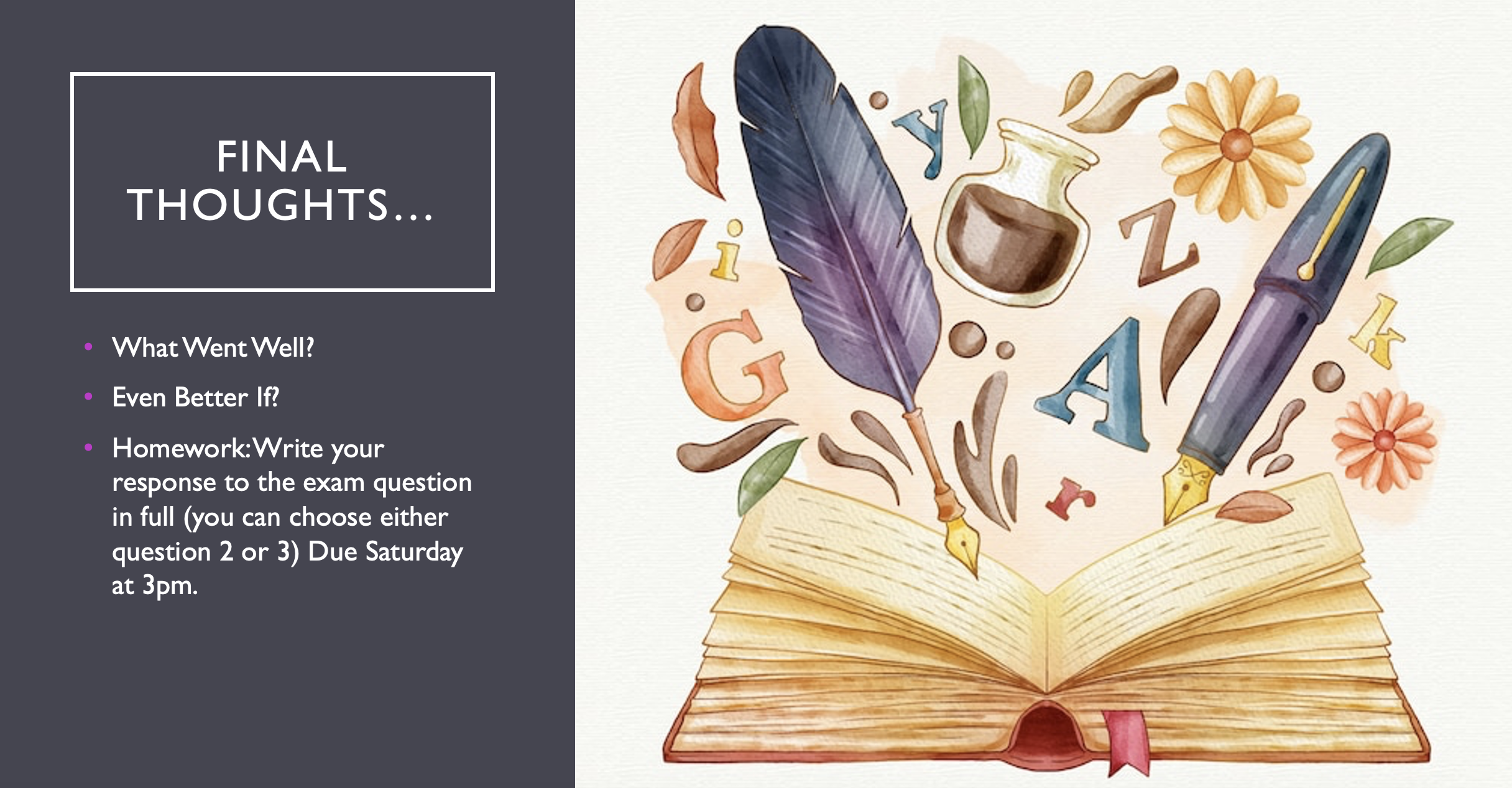
Attachments:
You must be logged in to view attached files. -
at 11:05 #38235
Diana
ParticipantLesson 2 Homework
The structure of The Silk Factory by Judith Allnatt was brilliantly arranged. The author has chosen to start the passage with a “statement” that provides abundant amount of information that stimulates the readers’ interest, but then the author stopped on expanding this plot, while unfolding the whole storyline through following paragraph, then when the starting sentence integrates with the rest, it pushes the plot to a climax and ends with an undetermined ending. The ingenious structure grasps the reader’s heart tightly throughout this passage.
The author started the whole passage with, “It was on their first day at the house that Rosie saw the stranger child.” The most eye-catching point within this sentence is the “stranger child”, which this phrase stimulates the reader’s curiosity and make them wants to explore more about this weird appearance of the strange child, since the author didn’t reveal any other description of this child except the word “stranger”. Those unknown information of this kid leads the reader to keep reading this story in order to know more about this child. Usually, the author will start to expand and add more details to the first sentence, and develop the kind of suspense it possesses. However, in this passage, the author stopped to continue describing the strange girl, but starting a new “perspective” of the story, apart from introducing the strange kid, this angle of view concentrates on depicting the ideal life Rosie and her kids have. Whereas this kind of contrast further develops the reader’s interest and cause them to wonder what will happen and make them more urgent to investigate more about the strange child that appeared.
The next paragraph was arranged in the middle of two paragraphs that focus on depicting the appearance of the strange kid with a suspense feel, but this this paragraph was quite different from the others, it supplemented the storyline to make it more complete and clear, it also has a transitional effect that aimed to develop the feel of suspense while a more detailed and comprehensive description was added. For the new “perspective” of the story, the author illustrates an idyllic and pleasant scenario of the kids playing, “Sam was kneeling beside the patch of earth that Rosie had cleared for him, making hills and valleys for his matchbox cars and trucks by digging with an old tablespoon”, a picturesque description that carries out the atmosphere of serenity. In addition, the author also included sentence like “Through the antique glass, Rosie watched them stretch and shrink as they moved, as if she were looking through ripples.” Reinforces the serenity and the pleasant life of Rosie and her family. But then the suspense atmosphere “returns” to the passage as the following sentence appears. “She (Rosie) closed her eyes, glad of a moment of calm after the trauma of the last few days.” The “trauma” was used as a foreshadowing for future plots since it gets involved with Rosie’s story that wasn’t unfold too much. Besides, this sentence sort of “echoes” with the suspense feel at the start of the passage. The next sentence also supports this point, “When she opened her eyes, another child was there.” The addition of a new and unfamiliar child echoes with the first sentence at start, where the two “perspectives” of story merged together, and then leads to the climax of this passage.
The more detailed description of the strange kid actually forms the climax of the passage, where the author describe the girl’s glance as “a quick, furtive movement as if she were scanning the upper windows of the row, afraid of being overlooked”, portrays the awareness and sensitivity of this girl, by using words like “quick, furtive” and “scanning” to reinforce these characteristics of the strange kid. The author also used phrases like “animal-like” to describe the strange girl, which by describing a human as “animal-like”, the contrast between the description and reality exaggerates the suspense feel and helped to shape the uncanny atmosphere within this description. At the end, “But when she (Rosie) stepped outside, the child was gone.” The story was wrapped up with an unpredictable ending, while reinforcing the suspense feel, also leaving the readers with plenty spaces of imagination.
Overall, as the beginning of a novel, this passage has an innovative structure that helps the author to present her story. The ingenious structure first captures the reader’s curiosity that causes them to keep reading, which provided the author a chance to fully unfold the plotline to the audience, then urging the plot to climax. The structure successfully serves to the presentation of plots and the way how Judith Allnatt arranged every part of the story was wonderful that it clasps the audiences’ heart.
-
at 14:28 #38327
-
-
at 12:34 #38434
Beth
ParticipantSummary for Lesson 3
In today’s class we focused on theme, an important place to start when considering the ways in which writers construct a piece. We spoke about how theme differs from moral or message and discussed what themes are likely to come up in the GCSE exam. We then analysed a GCSE passage by George Eliot, digging into the themes in the passage and what they reveal about the author’s worldview. The class wrote paragraphs, exploring how a focus on themes in their paragraphs can help them to structure their arguments. Finally, we went through a five-step process for literary analysis and dug into how analysis is a lens onto the author’s worldview. Fantastic work today class, well done for your tightly focused analysis and perceptive readings of the texts we studied. Happy Chinese New Year and see you soon 🙂
Theme in literature video: https://www.youtube.com/watch?v=I5KZcdAmWLw
Homework
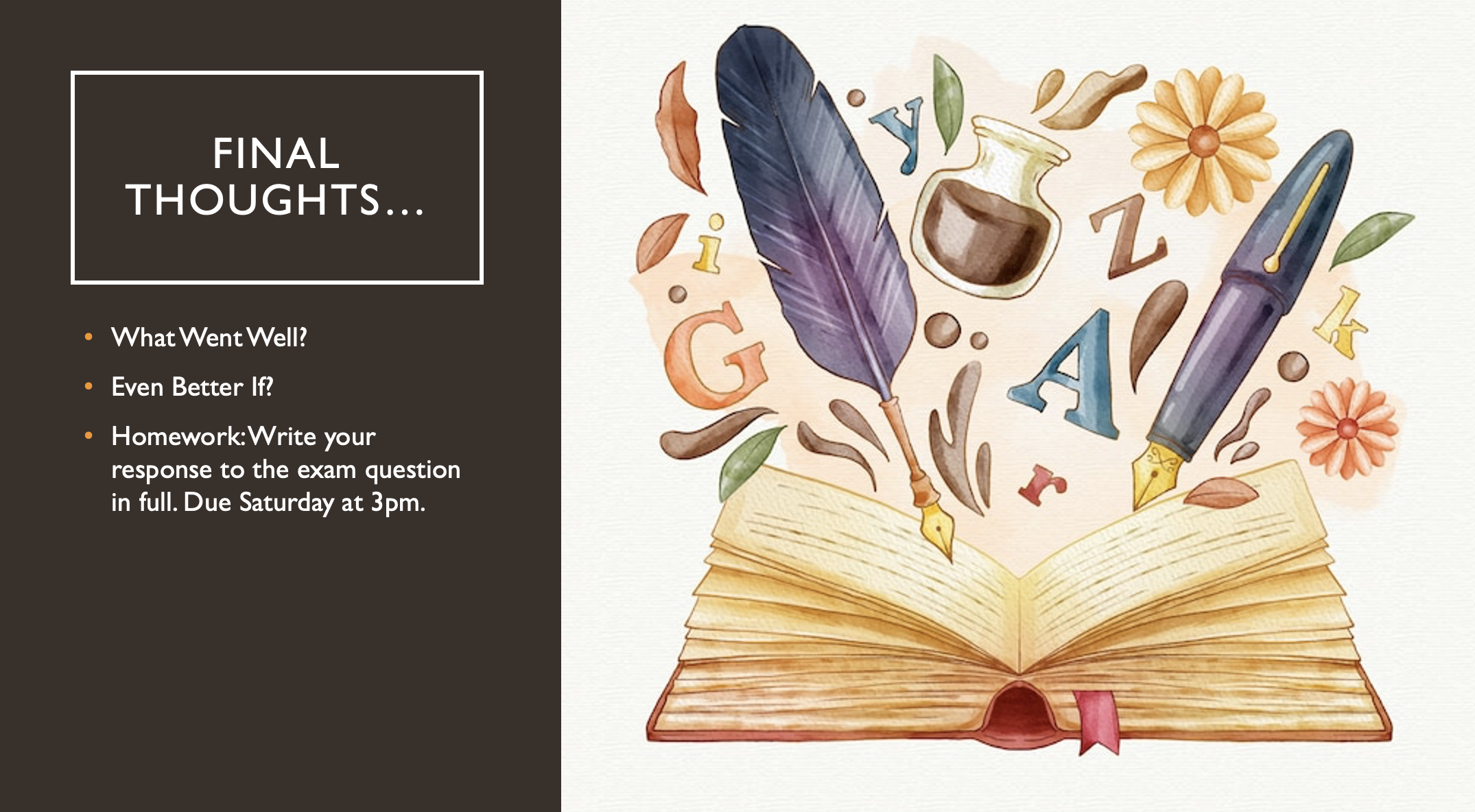
Attachments:
You must be logged in to view attached files. -
at 07:57 #38744
Andre
ParticipantHomework 2
The author was very successful in terms of describing the garden. The author uses great words and phrases, language features and techniques.
The author uses wonderful words and phrases when describing the garden. In line 1, the author first presented the garden as a “unfamiliar” garden. This proves that Rosie has not been to the garden before and does not know what is in there. In line 2, The author writes about the plants and the condition of the garden. In the garden there was an “overgrown mess”, “muddle of trees and shrubs”. These all prove that the garden is abandoned for a long time. Since in modern days, people always want their home to be clean and organized. Therefore, a garden with “overgrown mess” indicates that the unfamiliar garden is abandoned and might not be a safe place for children to play. The “muddle of trees and shrubs” also show the reader that the garden is not under the care of anyone. If someone owned the garden, then these “muddle of trees and shrubs” would be cleared away. For instance, my family has a yard and we always kept it organized and cut out weeds every several days. In line 3, the author states that an “ancient mulberry tree” stands in the center of the garden. The word “ancient” also shows that the plants have been growing wild for a long time. The tree is probably grown long ago before, when the garden is under care. In the next sentence, the author keeps adding details to the ancient tree. The author later starts to write about the wintry sun that hung low in the sky and it “threw long twisted shadows across the undergrowth within its cage”. This description of the sun indicates that the story most likely happened in summer. This is because during summer, the sun is usually nearest to the Earth. The temperature is also likely to be very high based on the words “twisted shadows” and “cage”. The word “twisted” usually appears when the author is writing about something torturing and in extreme condition. Therefore, a twisted shadow indicates a very hot temperature. The word “cage” is also the same. A “cage” is usually used to describe a restraint or condition that chains a character to reality or to a situation. In this case, the cage of the sun is anywhere under the coverage of its boiling heat. In the next line, the author deepens the impression of the audience on the condition of the garden by adding more details. According to the text, the tree grew up through “the broken bricks and chunks of cement”. Based on this evidence, the reader could infer that the broken bricks and chunks of cement is part of the remnant of a building. This provides additional support for the fact that the garden is abandoned for a long time and is long out of care. In the last line, the author describes the fence of the old garden and the abandoned path. The abandoned path “disappeared into a mass of nettles and brambles before it reached the padlocked door”. This proves that the garden is abandoned for a long time. Since there is no one caring it and cleaning the garden.
The language features and techniques are memorable. The author used a lot of similes and personification when describing the garden. The author wrote that the ancient mulberry tree “stood” at the center. This use of personification in describing the tree provides a clear impression for the audience about the how the tree grows like. The author also uses personification when the broken bricks and chunks of cement “chokes” the tree. These use of personification all make the story much more interesting and attracting to the reader. The author also uses similes. The author describes the knuckles in the earth as gigantic malformed hand.
In conclusion, the author did a great job in describing the garden in terms of the words used and the language features and techniques.
-
at 10:21 #38838
-
-
at 12:32 #38782
Beth
ParticipantSummary for Lesson 4
In today’s class we focused on genre and style in the GCSE exam, learning about common types of passage used by examiners. We began by looking at several examples, picking out patterns we could see in the choice of text i.e., Victorian lit, classic books, suspense, and description. We then studied some advanced techniques, applying this to a GCSE passage and looking at key ideas for how to unpick plainer examples of language. We then looked at some final key tips for the exam in preparation for our mock next week. Well done everyone for your hard work today, particularly when studying Crime and Punishment which is a complex text that you worked incredibly with. Keep up the wonderful work, see you for our mini mock 🙂
Video from today: https://www.youtube.com/watch?v=h6wNIBu9UzQ
Homework
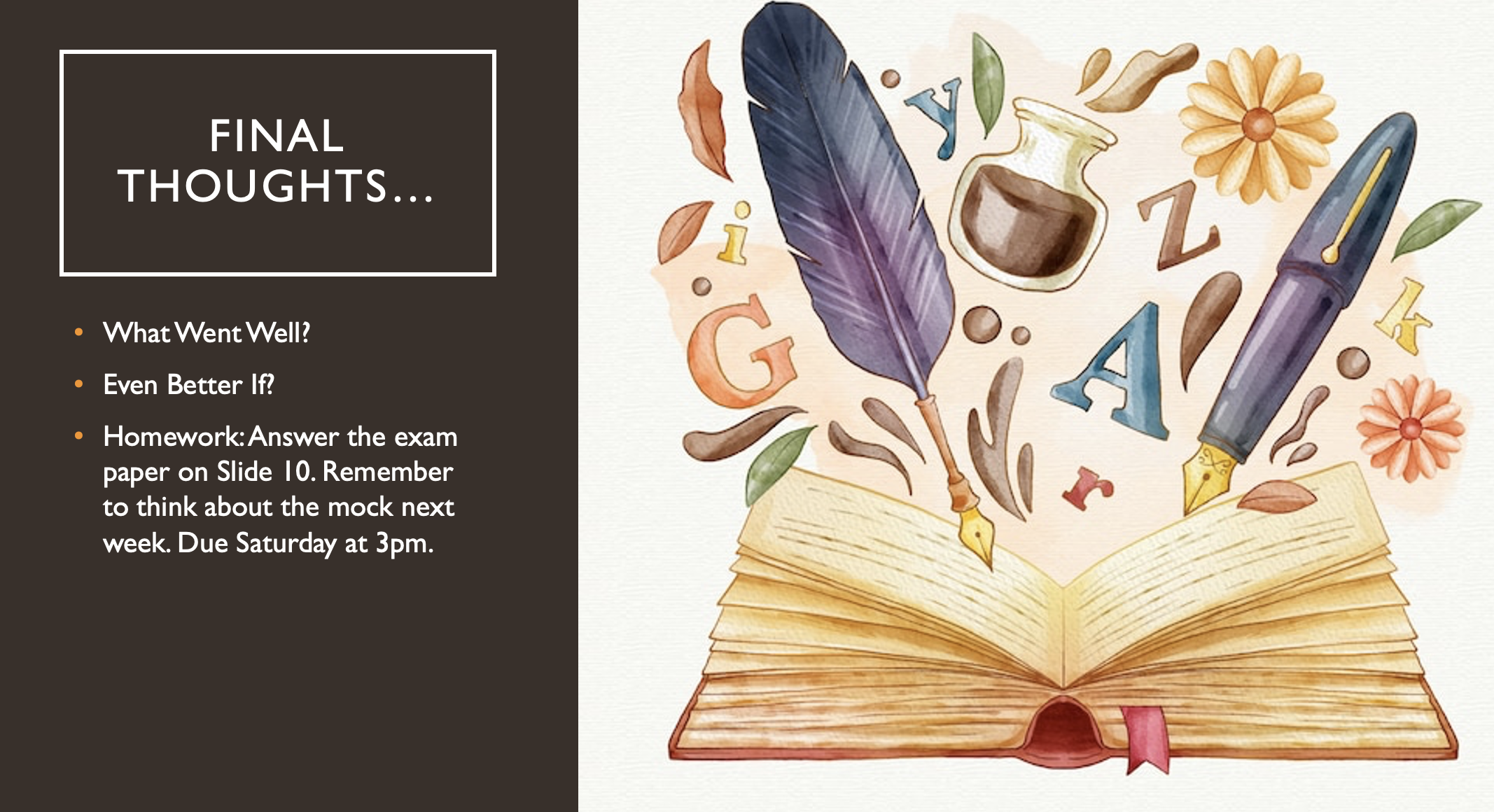
Attachments:
You must be logged in to view attached files. -
at 12:11 #39016
Diana
ParticipantLesson 3 homework
In the excerpt of “The Time Machine” by H.G. Wells, the author successfully presented the idea of a future world to the readers through two main aspects, the narrator’s perspective, and the interactions between the narrator and local people from the future world.
Firstly, the author fabricated the future world concept through the narrator’s perspective in a straightforward style of language. To illustrate this point with a specific instance, the narrator claimed, “I feel naked in a strange world,” when he first arrive, the narrator directly revealed the fact that the narrator was in a “strange world” that he does not belong, hinting the time travel that has been done. Besides, with the title of “The Time Machine”, the reader receives pieces of information that guide them to a conclusion that the narrator was likely from is currently in a divergent time period through the time machine. The feel of “naked” also supports this point as a supplementary detail. This “naked feeling” was more likely caused by the unfamiliar and unknown world the narrator just arrived, the narrator is quite “distant” from this current world, which proves again the narrator is possibly a time traveler. These fragments of information gradually lead the reader to ascertain the time travel background of this passage. “I looked more curiously and less fearfully at this world of the remote future”. The term “remote” suggests that the narrator’s from a disparate period of time, with information given in the previous paragraphs, the readers will end up with an inference that the narrator is a time traveler who travels to the future world that he does not belong to.
Secondly, the readers also gain pieces of information to verify the idea of background setting of a future world through the interactions between the narrator and local people. People who belong to the future world “came a step forward, hesitated, and then touched
my hand…they wanted to make sure I was real ” which the narrator himself was a strange existence to the indigenous people, hinting the narrator and native people are from divergent place that the narrator does not belong to this current world, which also validates the time travel and the fact the narrator’s in the future world.The author successfully constructed the future world’s setting through this passage, with the first few paragraphs provides pieces of information that guides the reader to decipher the background setting of time travel, along with the subsequent paragraphs continues to present supplementary details to support and confirm this inference.
-
at 20:16 #39304
-
-
at 12:28 #39056
Kiki
ParticipantDombey and Son: Charles Dickens
In this extract, there is an attempt to create Florence’s thoughts and feelings. evaluate how successfully this is achieved. Support your view with detailed reference to the text.
In this extract from ‘Dombey and Son’, Charles Dickens successfully achieved his attempt to create Florence’s thoughts and feelings, by using various linguistic and structural techniques.
The author uses polysyndeton to show Florence’s desperate feeling. In the start of the passage, Florence was driven from her home by her father and stepmother, she fled hastily from the house, described the author as “without a thought, without a hope, without a purpose”. the author uses three “without” to show how desperate Florence is, for she does not have the accepted beautiful concepts of humanity in her heart. The use of polysyndeton shows Florence’s pain through her mental feelings.
Dashes are used in this extract to elaborate on concepts, which increases the desperate feeling shown to the reader. After Florence was rejected by her father and stepmother, she left the house but have nowhere to go. Yet she felt she need to go “somewhere – anywhere.” Dash is used to elaborate in this sentence, creating a stronger sense of pain by emphasizing it twice. “somewhere” indicates that Florence doesn’t have any idea of where to go, which denotes to her having nowhere to go. While “anywhere “shows that she is desperate enough to travel anywhere. both words are used to show Florence’s feeling of being lost. Another example was presented as Florence enters the market, but her desperate feeling has not yet fade away. In the middle of the passage the author writes “she had been lost in the wild wilderness of London—though not as lost as now—and went that way”. dashes are used again in this passage to elaborate on the concept of “lost”. the first “lost” is to be lost in the physical world, while the second is to be lost in her mental world. Yet the pain of losing in the mental world was much worse than losing in the physical world, further creating the sentiment of pain by comparing two loses. The use of Dashes accentuates on words or phrases by elaborating, contributing upon creating the protagonist’s immense sorrow.
The author uses the structural technique of dashes and the linguistic technique of polysyndeton to depict Florence’s sorrow successfully.-
at 21:02 #39313
-
-
at 12:31 #39057
Jonathan
ParticipantJonathan Lesson 5 Exam Answer
In the extract of Dombey and Son, the author has successfully created Florence’s thoughts and feelings of sorrow, with a variety of literary techniques.
To begin with, the author illustrates Florence’s intense conflict, “Where to go? Still somewhere, anywhere!” As a child, under the circumstance of being rejected by her own parents and left to the world alone, Florence’s mind is overflowed with a fusion of emotions. In reality, she has no place to go; she has no relatives or close friends. However, her instinct commands her to run away from her home, as a way to escape from the misery her family is giving her. This use of hypophora and exclamation demonstrates the struggles Florence is dealing with within her mind. With the hypophora displaying Florence’s fluster under stress and the exclamation displaying her emotional outburst of sadness, the author builds up tense and brings a feeling of despair for the reader, intriguing the reader to read on.
Afterwards, the author also uses speech to demonstrate Florence’s thoughts and feelings, ‘Oh, Di! oh, dear, true, faithful Di, how did you come here? How could I ever leave you, Di, who would never leave me?’. Once again, this is a method Florence uses to comfort herself and to flee from grief. Instead of intending to actually let her dog understand, she is also presenting her thoughts to herself through speech. ‘How did you come here’ seems to be corresponding her current situation of being abandoned by her family and running away. This clever use of rhetorical question demonstrates Florence’s emotions of sorrow once again, and her attempt to comfort herself and extract herself from the mess. As a result, the anxiety and is developed further, and a sorrowful feeling for the reader is created.
Therefore, with the use of hypophora, exclamation, and rhetorical question, the author has successfully created Florence’s thoughts and feelings, which exhibits her misery due to the rejection of her parents.
-
at 21:14 #39315
-
-
at 12:33 #39058
SofiaL
ParticipantIt was in the morning in winter
From the “sorrow, shame’ I could see that the author is creating a sadness and loneliness sense for the reader to let us think about Florence attitude
The author created an environment description at first to draw our attention to the place where they meet, and then put the camera more closer to Florence. It could put us on with the storyline.
The author uses the third narrative voice to describe the whole story, but it used the sum of Florence action to let us review her attitude and feelings, ‘surprise and curiosity in the faces fliting past her ‘ this is a quote which describes Florence facial emotion ‘ where to go’ this is the author using an own perspective of Florence to tell us obviously about her feelings and how lonely she was.
-
at 21:24 #39317
-
-
at 12:34 #39059
Biru
ParticipantL
-
at 12:35 #39060
Beth
ParticipantSummary for Lesson 5
In today’s class we completed our mock exam, thinking about putting to use all the skills we’ve studied over this course and consolidating our knowledge of GCSE analytical skills. Well done everyone for your focus and concentration today- you have been fantastic. Keep up the great work, see you next week and remember to come back here and check for your marks this week 🙂
Homework
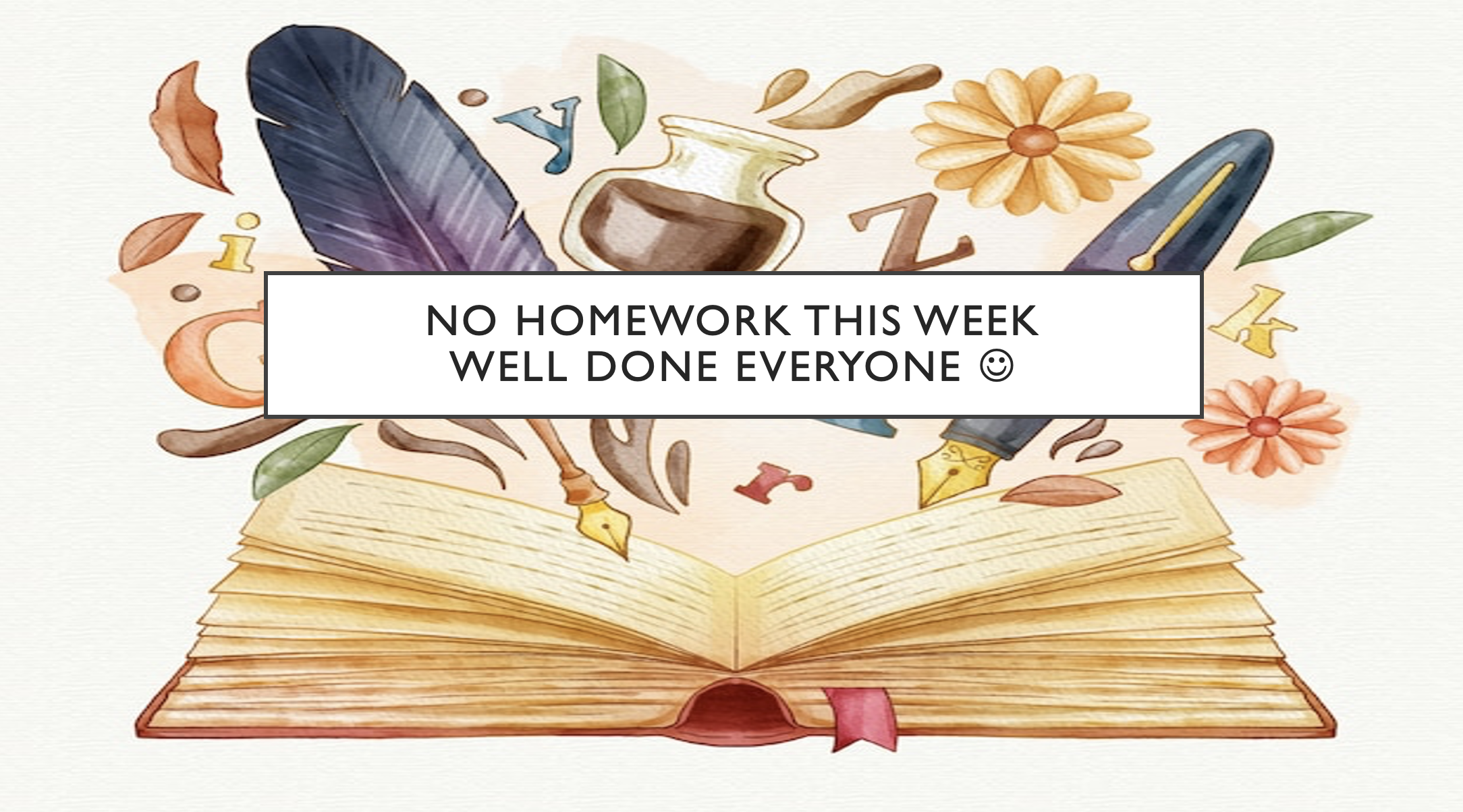
Attachments:
You must be logged in to view attached files.-
at 06:24 #39625
flower
ParticipantI am extremely sorry for the delay.
In the extract Dombey and Son, the author Charles Dickens successfully described and envisioned readers the protagonist Florence’s thoughts and feelings. The extract describes the scene when Florence is distraught by the refusal of her only relatives, and she runs away to find her old friend. This scene emphasizes Florence’s mental state and changes by stating feelings aloud, emphasizing Florence being alone and creating a contrast between Florence and the outside world.
Firstly, Dickens directly uses emotional vocabulary to describe the protagonist’s feelings. For example, Dickens mentioned, “In the wildness of her sorrow, shame, and terror…” The use of the words “sorrow,” “shame,” and “terror” is very straightforward. This sentence also uses metaphor, comparing Florence’s sorrow, shame, and terror to wildness, implying that Florence’s negative feelings are powerful and surround and cover her, being empty and replacing everything from reality with emptiness, sorrow, shame, and terror. Moreover, the sentence at the beginning of this paragraph emphasizes Florence’s distraughtness. However, in the beginning, the readers do not know why Florence is so desperate, creating suspense and attracting readers to continue reading.
Secondly, Dickens emphasized Florence being “one” and alone. The text mentions that she is “left like the sole survivor on a lonely shore from the wreck of a great vessel…” Using simile to compare Florence with a “sole survivor” from a shipwreck already is exceptionally lonely. However, Dickens described her as the only survivor from a great vessel. This is a comparison: At first, Florence is one of many in a great vessel, but after the shipwreck, she becomes the only one from numerous people. As if this is not enough, she is left on a lonely, empty shore with no one. This simile symbolizes her internal mental world and displays her empty, isolated, depressing feelings of being rejected and unwanted.
Thirdly, Dickens created a striking contrast between Florence and the outside world. The text described a cheerful, bright, fresh day with blue skies. This contrasts with Florence’s internal world of empty, grey, and sorrowful wildness or a lonely shore after a shipwreck, emphasizing how Florence is lonely in her miserable feelings while others are in joy. The other’s joy did not respond to her a bit; instead, it made her more despairing, wanting to “hide her head” and flee. Moreover, Dickens mentioned, “But there were people going to and fro; there were opening shops and servants at the doors of houses; there was the rising clash and roar of the day’s struggle.” The reality world is bright, full of people, abustle and astir, and the exact opposite of Florence’s internal world and mental state. Being in an environment that highly contrasts with one’s internal often worsens the feelings, feeling more left out and isolated from the entire world.
In conclusion, by stating Florence’s emotions straightforwardly, emphasizing Florence’s internal world of being solitary, and contrasting her internal world with the outside environment, Dickens envisioned readers vividly of a grey, dark, gloomy, depressing, empty, and alone mental world of Florence, thus displaying Florence’s thoughts and feelings.
-
-
at 12:35 #39062
Biru
ParticipantLesson 5 exam:
Throughout the whole extract the author, Charles Dickens, was very successful in scoping the thoughts and feeling of Florence and presenting them clearly to the readers.
To help the readers sympathize on Florence and step into her shoes, the author used a big amount of figurative language. In the beginning paragraph of the extract, the author introduces Florence with listing a bunch or negative feelings that she is feeling now, giving the readers a clue on how she might think and feel later. After that, the author used a metaphor “left like the sole survivor on a lonely shore from the wreck of a great vessel.” to emphasize on her looniness, and the loss of hope. Just after that, Dickens used parallelism of “led without a thought, without a hope, without a purpose”. Through the words without though, hope, and purpose, the readers could see the emotion of disorients that Florence is feeling in the moment, and the urgency she is fending. In later paragraphs the author uses contrast of the blue sky, fresh air of a good day in contrasting of the gloomy feeling the Florence is having, again highlighting the dark feelings that she is having. Constantly presenting the exaggerated emotions that Florence is dealing with.
To show the exaggerated feelings of Florence, the author used punctuation marks like exaggeration and question marks. For example, using short bursts of dramatic phrases to represent her thoughts. Lines like “where to go? but where! and oh Di!” to show her agitation caused by extreme grief. Although quotations are used mainly to show Florence’s thoughts in this passage, there are still detail that shows her thoughts.
I am not finished…😢
-
at 22:39 #39319
-
-
at 12:44 #39063
Sophia
ParticipantLesson 5 Exam
The author creates Florence’s thoughts and feelings by alluding to the environment and situation that surrounds her, and centering the passage around the theme of faith through the usage of language and literary devices.
The very first sentence start with the comparison of her feelings to a cheerful surrounding. While Florence is suffering from “the wildness of her sorrow, shame and terror”, she hurries through “the sunshine of a bright morning”. By straightforwardly introducing Florence’s feelings and having Florence meandering in a joyful environment, the author immediately establishes the sense of loss in faith for Florence as her originally desperate thoughts become even more evident with the comparison to her surroundings, further building her segregation from everyone else and her extreme helplessness. In addition, Florence’s change in feeling is illustrated through her interaction with the people around her. While it is frightening for Florence to blend into the world that she has already lost faith in, the people around her help her in recalling herself and make her realizes the necessity of greater composure. The author successfully creates a change in Florence’s thoughts through depicting a scene of people interacting with her, thus making her thoughts and feelings reasonable and relatable.
In addition to the author’s utilization of the environment that envelops Florence, Florence’s thoughts and feelings are further developed through usage of language and literary devices .For instance, the author attempts to create Florence’s thoughts and feelings by using nouns like “agitation”, “loss”, “sorrow”. These nouns give the reader a general yet specific direction of what the author is aiming to portray of Florence. From the amount of nouns, the reader could interpret the complicity and hesitation that Florence is facing. Furthermore, the author describes Florence as, “Wringing her hands and weeping bitterly, insensible to everything but the deep wound in her breast, stunned by the loss of all she loved, left like the sole survivor on a lonely shore from the wreck of a great vessel……”. The author compares Florence with a sole survivor on a lonely shore from the wreck of a great vessel, accurately illustrating her situation and despair through illustrative language. The wreck of a great vessel is of her home that she runs away from, it is broken and demolished n her perspective but she could still sense the presence of its relic from her memory that she is avoiding and her intense feelings. The author’s usage of “sole survivor”shows how Florence already marks herself as separated from her home, as she sees herself as the only survivor. The streets of London is compared to “lonely shore” as while Florence is away from the place that she loses faith in, she is yet in another place that makes her feel bewildered, a place that could not be called home.
In conclusion, the author uses features and elements from the environment around Florence to make her feelings apparent and distinguishable as her feelings and thoughts are disparate from the atmosphere she is within. The attempt to create Florence’s thoughts and feelings is further achieved through the author’s usage of language and literary devices, making Florence’s thoughts and feelings more eminent and readily for readers to resonate with.
-
at 22:59 #39321
-
-
at 07:47 #39084
Emma
ParticipantHere is my exam… I am not finished…..
Attachments:
You must be logged in to view attached files.-
at 23:10 #39323
-
-
at 15:26 #39283
Beth
ParticipantSummary for Lesson 6
In today’s class we began our work on writing, thinking about purpose, author and tone. We began by taking a quiz on these topics, using the GCSE syllabus to guide us, before watching a key video with top tips as to how to write a level 9 answer. The class then thought about how to apply purpose to different genres and vice versa, thinking about this in relation to a past paper question. We spoke about how to communicate audience and the class then completed an activity where they wrote two pieces on the same topic, changing only the purpose and audience, which they shared beautifully. Well done today everyone, remember to check for your mock exams and see you next week 🙂
Homework

Attachments:
You must be logged in to view attached files. -
at 12:59 #39327
Andre
ParticipantIn this extract, there is an attempt to create Florence’s thoughts and feelings.
First of all, the author uses a lot of action descriptions of the girl. For instance, the author wrote “In the wildness of her sorrow, shame, and terror, the forlorn girl hurried through the sunshine of a bright morning, as if it were the darkness of a winter night. ” The author presents the sorrow, shame and terror the adjective “hurried”. In the same paragraph, the girl “fled without a thought, without a hope, without a purpose, but to fly somewhere – anywhere.”. “fled” is usually used to describe someone that is running away from something. Here, it is more of stating the girl’s feelings that are introduced above. In the third paragraph, the girl was lost in London and was questioning herself: “Where to go? Still somewhere, anywhere! still going on; but where! She thought of the only other time she had been lost in the wild wilderness of London—though not lost as now—and went that way”. Via this inside activity and thoughts of her, the reader is indicated the nervous and uncertainness of the girl. The questioning of “where to go” presents to the reader that the girl is not familiar with the situation and is nervous about it. In the 4th paragraph, the girl cried in panic and dried her swollen eyes. The author wrote “drying her swollen eyes” which shows the reader that the girl is scared and panicking.
The sun shine and “sorrow, shame, and terror” form a contradiction, which makes the feelings of the girl more obvious
-
at 10:10 #39475
-
-
at 10:24 #39455
Emma
ParticipantHi Beth!
This is my homework 🙂 see you tomorrow!!
Attachments:
You must be logged in to view attached files.-
at 11:41 #39542
-
-
at 16:23 #39495
Beth
ParticipantSummary for Lesson 7
In today’s class we had our second session on non-fiction writing in the GCSE exam, thinking today about articles and essays. We began with an exercise on figurative language before thinking about the key differences between articles and essays as a medium. We then read through an article and analysed it for effective techniques, purpose, audience etc. before discussing the effect of these in context. We learned about ethos, pathos and logos and the class came up with their own debate topics that played off one of these elements of persuasion. Great work today everyone, really good focus and diligence today in completing these tasks and thinking carefully about the different ways arguments can be structured. Excellent work, see you next week 🙂
P.S. You can choose either task on Paper 3 to complete for homework
Pathos, ethos and logos video: https://www.youtube.com/watch?v=pt_udRiOm_8
Homework
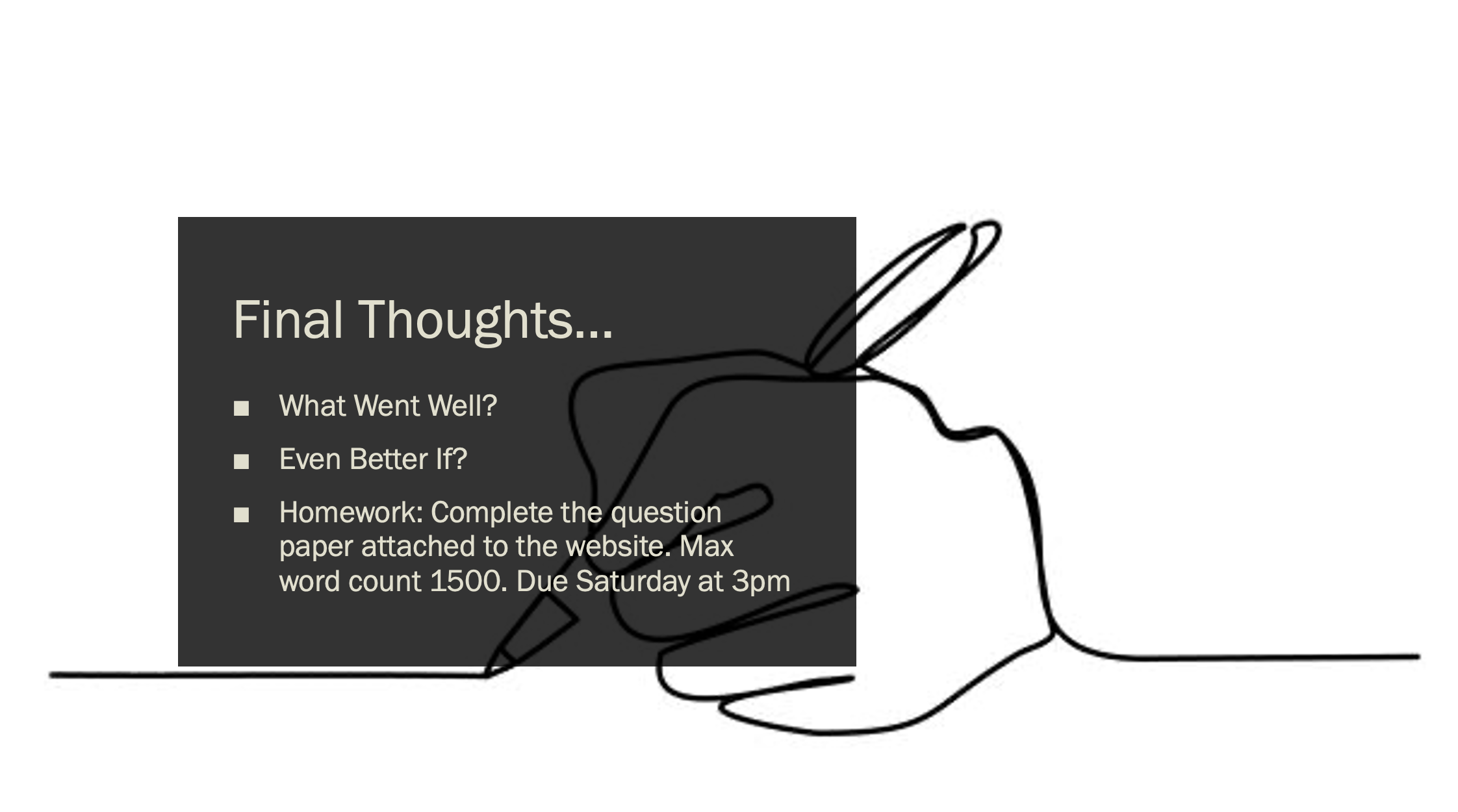
Attachments:
You must be logged in to view attached files.-
at 15:59 #39639
flower
ParticipantGood evening, everyone! First, I have a question: Have you ever volunteered for a charity activity? Yes? Very nice.
According to UNESCO, about 244 million students between the ages of 6 and 18 are out of school, without education. This is mainly because of the unequal distribution of educational resources. Remote regions have fewer schools and fewer teachers, and the ability and levels of the teachers are also relatively low because they need such an excellent educational environment and resources. This resulted in the rate of progression to higher levels of school being only 6% in rural areas, compared to 21% in urban areas at the upper secondary level. Therefore, actions must be taken to help those students in need. We need more talents with better abilities for better societal development!
Therefore, today, I am here to inform you about a charity named AIEP, which is the Artificial Intelligence Education Program. We aim to use this century’s newest and most significant invention, AI, to promote and assist education in remote regions. Our final goal is to improve the rate of progression in remote areas.
However, we are facing difficulties in using AI to help those in need:
Firstly, we need to equip schools with electronics such as computers or iPads, which is a massive cost for us, as we want to help a wide range of people. This would need all of your help in investing and making donations.
Secondly, we must teach teachers and students in remote areas how to use AI correctly and efficiently. Otherwise, the help will not be virtual. Volunteers would be needed to prepare teachers online or offline, according to your preferences.
Though you might think this will take up so much of my time! This is very hard! Why should I do this? How will this benefit me?
This is a relatively easy activity. No matter how much money you have, your donation can make a significant difference: You can help by simply organizing charity activities, for example, Bake sales, drink sales, or performances that require tickets…these are all small things that could be a great help for those kids in the mountains! Your contribution, no matter how small, can bring a smile to a child’s face and open doors to a brighter future.
For volunteering to teach the use of AI: We all have the equipment and conditions for using AI, and if I am right, most of you should have already used AI. Making a short tutorial video would be helpful. Joining online meetings and answering questions from the kids and teachers from the remote areas will be even better for them. If you are available, joining our summer camp to actually go to the places to help the kids will be a great experience, not only for those kids in need of help but also for yourself as well.
This activity can be an excellent exercise for you, especially for students: Organizing activities practices leadership skills and ability to cope with real-life problems. Online meetings practices your public speech techniques, ability to explain things, and your logic. Offline activities are even more beneficial. Going to places that highly contrast with your living environment gives you a clearer worldview, you will know what other people in other places in the world are like, how their lives are like. Moreover, in a more strict environment, practice your adaptability and survivability. Teaching and helping the kids enhances your logic, presentation, social, and communication skills. This is not just a charitable act. It’s an opportunity for personal growth and learning that can shape your future.
In addition, charity is not just about individual benefits. It’s about the greater good. For applying to foreign colleges, having multiple experiences in charity volunteering or making significant donations might be a great help. But let’s consider the whole society! For society to improve, we need more intelligent people to invent new technology, improve life, promote philosophical thinking, and improve laws and rules…these all require people with high abilities. Therefore, for a greater societal improvement speed, for a better future, please join us and give a small contribution to your future societal world! Your contribution can be a catalyst for societal change and progress.-
at 18:06 #39744
-
-
-
at 06:57 #39626
Jonathan
ParticipantLesson 7 Homework
Ladies and gentlemen,
Today, I stand before you as a believer in hope and compassion, advocating for a cause that transcends self-interest and touches the core of humanity: volunteering with charity. In our present-day world, where inequalities constantly emerge, volunteering offers us a pathway to reshape our environment, to uplift those in need, and to foster a sense of community and connection.
There are countless ways to get involved with charity, each offering its own unique opportunities for service and impact. From hands-on activities such as serving meals at a local shelter or participating in community clean-up projects, to more specialized tasks like fundraising, event planning, or offering professional skills, there is a role for everyone to play in contributing to the greater good.
But what kinds of charities can we support, you might ask? The beauty of volunteering is that it has no boundaries. Charities encompass a diversity of activities, each dedicated to addressing specific issues and improving the lives of others. Whether it’s supporting minorities, providing aid to disaster-stricken areas, promoting environmental sustainability, advocating for animal welfare, or advancing medical research and humanitarian efforts, there is a cause out there that speaks to each of us, waiting for us to lend our support and make a difference.
And why is it important to volunteer, you may wonder? The answer lies in the power of service. Volunteering not only benefits those we serve, but also enriches our own lives. It fosters a sense of purpose and fulfillment, cultivates empathy and compassion, and nurtures personal growth and development. Through our collective efforts, we not only address urgent societal challenges but also strengthen the bond of our communities and build a brighter, more inclusive future.
Moreover, volunteering offers us an opportunity to connect with others who share a mutual passion for making a difference. It provides a sense of belonging, as we come together with like-minded individuals to effect positive change. In a world often characterized by division, volunteering serves as a unifying force, bringing all people together in pursuit of a common goal: to create a world where compassion is established for everyone.
In conclusion, I urge every one of you to respond to today’s proposal by volunteering with charity. No matter your expertise, your profession, or your age, your contribution matters. Together, let us harness the power of volunteering to build a brighter, more compassionate world.
Thank you for your attention and your commitment to making a difference.
-
at 09:33 #39718
Beth
ParticipantSummary for Lesson 8
In today’s class we looked at essay writing skills, focusing on structure and persuasive technique. We began with metaphor work before discussing essay structure and thinking about the importance of intros and conclusions for shaping an argument. The class then completed some fantastic group work where they workshopped a persuasive prompt together, pulling in ideas about logos, ethos and pathos, and finally discussed how to craft an introduction before writing these independently. Well today today everyone, really great work and fantastic group work in particular. Keep up the wonderful job and see you next week )
Intro & conclusion video: https://www.youtube.com/watch?v=PO0d-yYfvuk
Attitude change video: https://www.youtube.com/watch?v=o6oyCeYQWPE
Homework
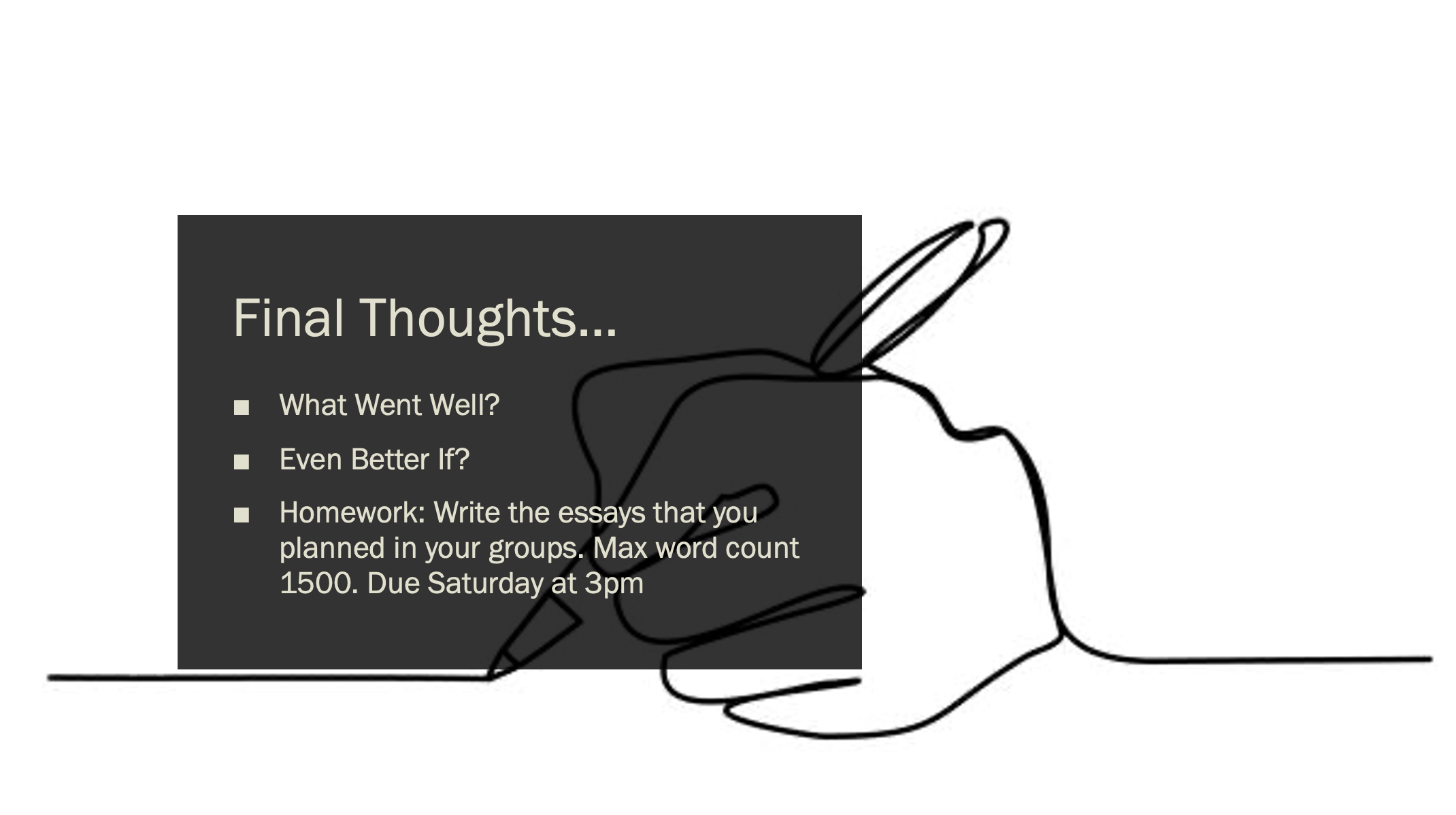
Attachments:
You must be logged in to view attached files. -
at 00:52 #39837
Kiki
ParticipantWhen is looting O.K?
Have you ever thought of earning a fortune by looting? of course, it is a wide-known fact that looting violates the law, but can there ever be a condition in which looting is acceptable? Most people might argue that extorting from other’s fortune to fill one’s pocket ought to be condemned guilty. Yet, under some circumstances, such as when looting is for the greater good or simply to survive, looting should be accepted.
First, when looting for survival it should be morally acceptable because society should be responsible for an individual’s hunger and hardship. Nowadays, many people swarm into big cities in search of fortune and job opportunities. As the population is urban cities increase, the price of residence, food and life necessities will increase dramatically. As the profit-driven companies acknowledge the huge demand for such products and the fact that the demand for such products will not decrease even if the price increases, many people stumble to earn bread and butter in the city. In the rural areas, the residents harvest and sell crops in the periphery of civilization, most of the population in the country does not recognize their existence. All they could do is harvest crops when the weather is fine and emaciate during the constant famines. These are social problems that the country is facing, not the people’s fault that they are in a tough spot. Survival is human instinct; the people are not immoral when they loot for their family’s survival. In the contrary, it is the society that was immoral to those individuals. The famous Chinese philosopher Mencius once said: “human nature is inherently good”. It is the wrong doings of the society and the companies that exploit ordinary people of their fortunes, forcing them to loot for bread and butter. Henceforth, they should not be blamed, as it is the society to forced them into such as spot.
Second, when looting is for the greater good it should be accepted. Suppose that there was a girl, who realized that family A have secretly hoarded guns, which were banned in the world for the sake of humanity’s eternal peace. Guns are seen as signals of war; the girl was shocked. So, she looted from family A, and was called to hearing by the court. Of course, she was not condemned guilty but received accolade. The purpose of actions is often more important than the action itself, the girl did loot from family A, however her purpose is noble and kind. When an illegal action is triggered by a good will, then it should be accepted.
In conclusion, when looting is done for a noble purpose or simply to earn sustain one’s life should be morally acceptable. There are many flaws in society that are waiting for humans to resolve, we cannot condemn people guilty when they are simply victims of the society’s mars or trying to solve the problems they realized. Let us all take action and help the ones in need to make the society better and praise the ones who acts for the greater good of humanity.-
at 10:10 #39881
-
-
at 11:49 #39865
Emma
Participant-
at 10:11 #39883
-
-
at 15:42 #39871
flower
ParticipantWhen is looting morally O.K.?
Looting is often considered as morally unacceptable, as for all parents and teachers instructs students to never loot. However, imagine this scenario: There are two boys, as lean as a rake, running away; while a fat man is shouting and chasing the boys down the street, shouting “You little thieves! Give my bread back!” Though the baker is not especially wealthy, he is obviously not poor, having no worries about food and clothing. The baker is also a callous person, treating his family and neighbors harshly. Whereas the boys are orphans, of skin and bones, haven’t eaten for many days, and will soon die of hunger if they don’t eat. They have no money; their only choice is to steal. In this case, is looting morally acceptable? When looting is for survival or for a greater good, it should be considered as morally acceptable.
Firstly, in the cases of survival, when human lives are the matter, people should prioritize human lives over everything else. Looting without killing but saving a life is a noble act. In any case, saving more people is always justifiable. Human lives are the most valuable and are extremely limited. Human lives are irreplaceable. However, things like bread and food are all replaceable and small in worth. Humans are the dominant power on Earth; we can recreate things, but other things cannot recreate humans.
Secondly, looting for the greater good is a justified action. For example, a strong country is invading a weaker country. The weaker country sends out an agent to steal the top secret of the stronger country to save all their people and their country. In this case, the stronger country is invading other’s property with no justified reasoning. Many warriors would die in the battle; many commoners would be severely affected in the wars—if not killed, then unable to survive with no property and work. According to CBS News, over 50% of people were lost in the Ukraine war. All the losses were due to invasions and wars. But what if looting a major secret can prevent all the wars and damages? People should consider this as morally hortative!
In conclusion, when looting is for noble actions such as saving lives, survival, or for a much greater good. Looting should not be considered usually but should be considered comprehensively. When the benefits outweigh the damages caused by looting, it should be regarded as morally O.K.
-
at 16:29 #39945
-
-
at 16:45 #39899
Beth
ParticipantSummary for Lesson 9
In today’s class we completed the non-fiction section of our GCSE writing course in terms of content, looking at speech writing. We thought about ways in which a speech differs from other forms of text, shared good speeches we had seen in the past and looked at a myriad of techniques to use in starting and closing a speech. The class read examples of good speeches, thought about language techniques and brainstormed their approaches to speeches in response to a prompt generated at random to get them to think on their toes. Fantastic work today everyone- remember we have a mini mock next week and well done for all your wonderful ideas today. Keep up the great work, see you next time 🙂
Speech video: https://www.youtube.com/watch?v=EMmAriRCl20
Homework
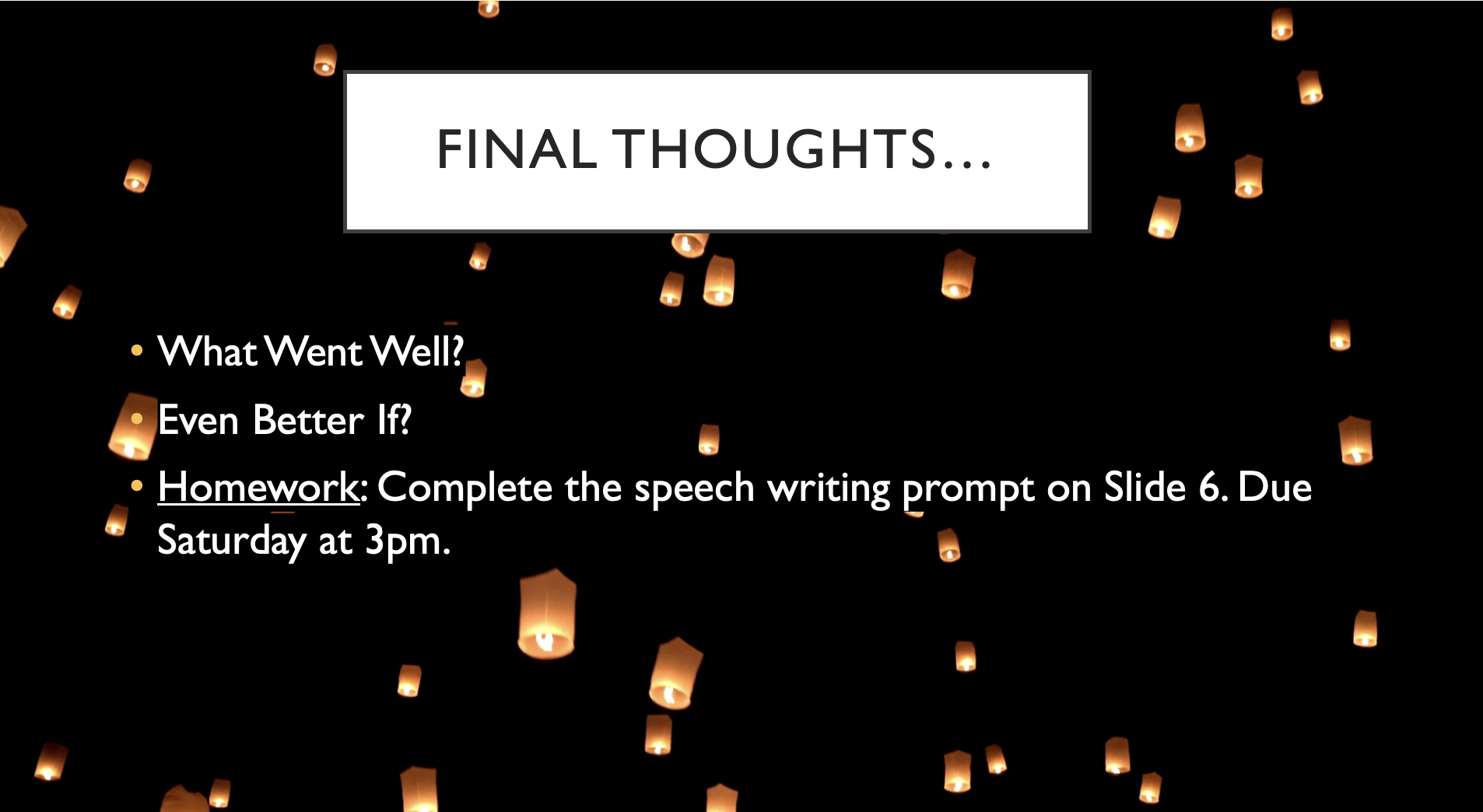
Attachments:
You must be logged in to view attached files. -
at 12:28 #40033
Kiki
Participantprompt: Music has no value when you are studying.
Hello ladies and gentlemen, I am Kiki, here to talk to you about listening to music while studying. Do you have a habit of listening to music while studying? Apparently, it has become a trend to listen to music because music is relaxing and enjoyable. Yet, it might be the best choice to listen to music while studying, because it halves your focus and limits your creativity.
Focus, in no doubt, is one of the most essential factors of studying. It allows you to easily focus on your task, increasing productivity as well as the quality of the task. A study in Michell university claimed that students who listen to music while studying get lower grades comparing to students who don’t, concluding that focus is one of the most vital factors of studying. Focus is not a fidget toy, even though they both start with the letter “F”, fidget toys could resume their past shape after deformation, but our focus cannot. Focus will only decrease and decrease. As focus decrease, the only way for you to focus is to fill your focus using other things, which could be listening to music. As time passed, you will find that listening to music, surprisingly, is the only way for you to focus on your study. Ladies and gentlemen, imagine that you are no longer able to focus on task without listening to music, how would you feel? sad, irritated, angry?
Coming to my next point, music limits your creativity. It strikes most people to realize how important creativity is in our life. In a school, the teacher assigned the students a task, which is to record a video about anything. Most students start preparing on the very first day, yet one of them, let’s call her A, did not do anything till the last day. In the last day, she rented a camera and crawled around the school while recording, and she named her video “to see the world like a dog”. and she got the highest score in her class. Of course, I did not share this story because I want to discourage hard work, but merely to emphasize the importance of creativity. It could be the pathway to promotion and success in our career life and the trap for high scores for students. Will you want to limit your creativity and obstruct your path to a better future? I believe most of your answers will be no.
To wrap it up, we shouldn’t listen to music when we are studying since it halves our focus as well as limiting our creativity. Which affects our work quality drastically. Because of the reasons above, I strongly urge you, ladies, and gentlemen, to stop listening to music while studying. Thank you for listening, looking forward to seeing you next time!-
at 20:14 #40114
-
-
at 01:06 #40048
-
at 20:31 #40116
-
-
at 02:35 #40050
flower
Participant‘Music has no value when you’re studying. It can be distracting; it can be too loud. Students should work in silence.’
Have you ever listened to music while working? Yes? Exactly! Everyone has listened to music before while working! This is what many people do, so there must be a beneficial reason behind that choice. My speech will focus on the correct way of choosing music and how music can benefit working processes.
Firstly, choosing the appropriate type of music according to personal preferences is essential. As we all know, there are numerous different kinds of music. Some are calm and help people to concentrate; some are rhythmic and encourage people to keep going in a fast paste. Different types of music make different people concentrate, just like food. Some people are allergic to peanuts, and eating peanuts can cause anaphylactic reactions; some people are allergic to milk. But people always have something they can eat to gain nutrients and energy from food. Similarly, choosing a suitable type of music is essential and can help people concentrate. However, it is comprehendible that the wrong music can lead to harmful consequences such as distraction. Therefore, choosing the correct type of music is extremely important and valuable.
Moreover, silence is only sometimes good for working. For example, even if most studies show that “silence is golden when tackling the most difficult tasks.” It is specified only for the “most difficult tasks”. What about the other tasks, then? Let me tell you:
First, in tasks related to creativity, music can be a great inspiration and a boost to your imagination.
Second, when too many tasks lead to boredom, music is a great motivation and can even speed up the paste!This is only a tiny portion of the benefits of music. But I believe, now it is crystal clear why music does not have “no value when you’re studying”, the right choice of music can lead to significant benefits and can be a great boost and motivation!
Thank you.
-
at 11:42 #40074
Jonathan
ParticipantLesson 9 Homework
Have you ever wondered how do people keep themselves focused when studying? If you do a survey, you will find music to be a popular choice. Music does have a value when studying. It relieves your stress, it enhances your concentration, and it boosts your memory.
We all have tried putting on a headphone and playing music when studying. Be honest with yourselves, that feeling of cancelling off distractions is phenomenal. Even if you have an exam coming up tomorrow, music can put your anxiety aside, and focus your mind on studying. Do not think this is only your own perception: according to USA Today, music can reduce anxiety as much as a massage. Sounds impressive, right? If you are frequently bothered by poor academic performance due to anxiety, music is the medicine you need. Simply worrying about the future uncertainty is futile; but by listening to music, you become capable of doing the most effective method at the very moment: begin studying. You will gain more knowledge and perform better. Music is the stepping stone to success, and what it simply does is cutting you off from worrying.
The science behind this is mind-blowing. According to a Stanford study, music engages the areas of the brain involved with paying attention. Thus, the external distractions can be muted, and your brain energy will be utilized for the most important thing – studying. Furthermore, an UC Davis study has shown the strong connection between music and memory. People tend to store memories into a song. When the song is played, they can clearly remember their incidents or emotions related to the song. If you ever heard about the term “earworms”, that is an effective way of improving memory. As the melody you played during studying is stuck in your head, the knowledge memorized along with the melody will also be memorized, and hence improves your academic performance.
Music is the key to successful studying. If you study in silence, any noises will be amplified, and no knowledge will last long. Studying with music empowers you to relieve, to concentrate, to memorize. Some people are one step away from success; all they lack is music, the tool scientifically-proven to be effective for studying. Next time you study, try playing a song from your device. All of your stress will magically disappear, and the only thing that enters your head will be the knowledge you learned!
-
at 20:56 #40121
-
-
at 13:27 #40082
Beth
ParticipantSummary for Lesson 10
In today’s class the students completed their mock exams. Really great work today everyone, you were all very hard-working and focused and I can’t wait to read what you’ve come up with & to read your pieces. Excellent work over the past few weeks, keep it up and remember to check back here for your marked work. See you soon 🙂
Homework

Attachments:
You must be logged in to view attached files. -
at 13:27 #40084
-
at 16:59 #40251
-
-
at 13:28 #40086
Kiki
ParticipantEducation is not just about which school you go to, or what qualifications you gain; it is also about what you learn from your experiences outside of school. Write. a speech for your college or school Leaver’s Day to explain what you think makes a good education.
Hello everyone, I am Kiki, here to discuss with you about education. I believe education is not just about what school you go to, or the qualifications gained, but its more about your experiences outside of school. Have you ever had an event in your life that inspired you a lot? please raise your hand if you did. As we can see most of our ladies and gentlemen have that kind of experience. Do you feel that the experiences inspired you more than your teacher’s monotonous lectures? and again many people vote yes.
Even in school, we are living our lives. More than half of our day consists of activities unrelated to academic study. Our outside school experiences obviously play a more important role to shaping our personality and mindset, judging its time span.
Have you ever felt bored of a teacher lecturing about the philosophy of humans and the world? least I did. What they tell us are just abstract concepts, even if they are correct in some extent. Humans are curious creatures, they do not easily believe in what others say, it is mandatory for them to learn knowledge by experiencing it in their own life. It’s easier to learn that fire is hot if you touch it; it’s easier to learn that syrup is sweet if you smell it; it’s easier to learn that pepper is spicy if you taste it. Also, education is aimed to help a person thrive in the world, the best way for someone to master a skill it to practice, and experiencing life outside school is practicing our skills to live in the world.
Lastly, diving into some philosophical concepts, we as humans are curious of the world, this motivates us to study. Even though school education provides us with a more systematic method of studying, but the outside school activities is the base catalyst of our creativity and pursue of knowledge, it is the source of curiosity. Humans create education because they are curious of the world and want to know all aspects of it and believe that their descendants will think the same. Education is a easy way to fill one’s curiosity, but sometimes people forget that they are curious when information comes easily. Outside school experiences is always a way to remind one of their curiosities and boost their interest in what the teacher is telling and motivate them to be more immersed in academic study, while teaching people to enjoy their lives.
Fellow graduates, this is what I believe of education and outside side experiences. What do you think? if you wish to comment on this topic, please feel free to write to me or call me anytime! thank you for listening, looking forward upon seeing you next time!-
at 17:23 #40253
-
-
at 13:28 #40087
flower
ParticipantMy fellow schoolmates, happy graduation! Congratulations on completing your school education! Now, you are moving on to a new phase of life! But, is this the end of your life education? Are you ready for everything that you have nothing to learn anymore? There is an old Chinese saying: “ Live till old, learn till old”. Education is not and should never be restricted within school courses. What is truly important is the life skills you learn when you really step into society without the sheltering of parents, school, and your young age. Moreover, a good tutor, regardless of age and literacy, is truly a beneficial education that could continue outside of school or even from outside of school.
Firstly, education is about life skills learned from experiences instead of only knowledge from school classes. School classes focus on teaching and informing students about basic facts and understanding of the world, historical, natural, and present… in primary school, this is crucial knowledge for the kids to build a basis for recognizing the world and understanding the most basic functions and principles. However, this is obviously not enough. Unthinkingly following these knowledge and rules may lead to harmful consequences. For example, imagine a scenario of you and your colleague. Your colleague did not do any work while you worked hard. In school, your teacher instructed you never to lie. Therefore, when your boss checks your achievements, your colleague lied, saying he lost his work. When your boss confirmed that your colleague lost his work, you said no and told the truth. Then your boss punished your colleague. After that, your colleague hated you, which badly affected you. For example, in collaboration work, you can never collaborate easily with him. This is caused by the fact that without sufficient social contact and experience, you do not know the best way to deal with situations like this that require a higher level of social skills. A correct way to respond might be to say you are not sure. You should never lie, but directly exposing your colleague who works with you is never a wise choice. Therefore, real-life experience in society to continue learning life skills is crucial for better performance in work and future living; this is also a significant part of life education.
Moreover, tutors are also an essential part of education. These tutors may be from or not from school and can continue to be a life tutor after graduation. For example, my brother’s debate coach and philosophy professor is what he considers his life tutor. He always goes to his tutor for advice when he faces academic or personal dilemmas. This tutor led him out of his most depressing miseries and led him to success with an offer from an Ivy League university. These tutors possess great wisdom and give valuable advice and knowledge that might not directly solve problems but will benefit the student. Even if they are not by the student’s side forever, these tutors can be life-long tutors, for their help lasts forever. Thus, a great turtor is a significant part of life education.
So, my dear schoolmates. Never stop acquiring knowledge and never stop learning things for life. School is never the endpoint of your education but the starting point that leads you to the great things you will learn later in life. Excellent education awaits you, but always keep a passionate heart in acquiring new things. Happy graduation! Thank you.
-
at 17:56 #40255
-
-
at 13:29 #40088
Jonathan
ParticipantLesson 10 Mock Exam
‘Education is not just about which school you go to, or what qualifications you gain; it is also about what you learn from your experiences outside of school.’ Dear school administrators and my fellow students, what traits do you think should good education include? To me, a good education means a school giving students freedom, the freedom to experiment with different fields of study, the freedom to develop any hobbies or skills, the freedom to make their own decisions.
A good education should be a miniature of the society. Students, are no longer students; they are the innovators of the world. A student can have diverse identities: they can be an athlete, an artist, an author, or a mathematician. Only in this way, the students can seek their true ambitions of life. Their ambitions should not be restricted by the school system or other’s expectations; it should be unique for every single one of them. With a free learning environment, the students’ dreams become the fuel for learning, and they will chase their dreams without hesitation. As they run and run, until they graduate from school, the long chase becomes a force of habit. the students will acquire a progressive mindset, which they will benefit from in the rest of their lifetime.
Only with an environment of freedom, the students can keep in touch with reality, a reality where you need to face cruel decisions and occurrences every day. A majority of schools are ivory towers, not to enable the students to fly high like a free bird, but to trap them in for eternity. To me, a good student is not a student who gets full marks for all of their courses; instead, a good student is a student who has adaptability, who has survive and enjoy the world in their own way. In a rigid school system, a student will never become the latter. They will become a person with no capability with anything in life besides studying. But with a school system of freedom, students can adapt to the real society ahead of time. How to deal with social relationships, how ensure safety, how to arrange time well… All of these are important life lessons for students to learn in the future. But with a school providing students freedom, students will learn them beforehand, and gain an advantage when starting off in the lifelong race in the society, compared to the other peer competitors.
Therefore, a school should always provide students with freedom. Only with freedom, students can choose their life path with free will, pursue it with all of their energy, without leaving lifelong regrets; only with freedom, students can keep in contact with the real world of cruelty, which they ought to face in the future, and become ready for it. A school of freedom, is my definition of good education.
-
at 18:37 #40257
-
-
at 13:30 #40089
Sophia
ParticipantLesson 10 Exam:
“People protest about the cruelty of keeping animals in captivity, but they seem happy enough to eat meat, keep pets and visit zoos. All animals should be free!”
Freedom is a complicated concept. All of us have diversified definitions of freedom based on our very own identities and experiences. It is hard to determine whether we should apply our own perceptions to scenarios that do not require our direct participation, and matters often turn polemic when it comes to beings other than humans, that is to say animals. What is being free? Should animals be free? There is a general consensus among us that keeping animals in captivity like zoos is cruel, yet eating meat, keeping pets and visiting zoos are also a customary part of our lives.
As human beings, we desire freedom on both the mental and physical aspects. Keeping human beings in captivity indeed violates our rights and freedom. But even so, if captivity could provide us refuge, some may shudder and reexamine their original belief. Humans see themselves as the superior of all other beings on Earth, and animals are regarded as being less intelligent and incapable of critical, creative and in-depth thinking. Thus, if there is even a goal, the goal for animals would be to survive and die naturally. And if the process of survival could be more pleasing and less painful or possibly longer, animals would probably more than willingly accept it. If so, since animals do not have their definition of freedom as they could not develop one, the difference between a zoo and the wilderness is just in expanse. If freedom applies to animals’ basic needs, would it be more free to live in a larger space or to have a more enjoyable process of survival with ample food and safety guaranteed. Animals that have a lower position in the food change must learn to adapt to obtain greater benefits and survive, to the animals, the law of nature is what determines their gains and losses, and they must abide the law to be free. They learn to live with humans and make the most of what they could take. If the wild itself is cruel, what cruelty does living in a laboratory bring?
The law of nature is the supreme source of judgement. In response to what might seems to be a contradictory action of humans, while humans eat meat to survive, so does other animals. Pets are domesticated, their existence proves that they themselves are willing and dependent on the presence of humans. And not only that the freedom of animals is likely not contravened by zoos, zoos are also used to protect endangered species. What is freedom when one does not even have the most basic and necessary power to survive?
The query towards humans’ actions transgressing animals’ freedom itself is based on our own definitions for freedom. The ones that speak for the animals could never actually express animals’ actual thoughts. The idea itself is absurd in a way, yet it also manifest how us as humans occupies the leading position on Earth, as it is us who question and advocate for the right of the ones that could not speak. There is no definite answer to this dilemma as long as we hold this position and the victims of this issue could not speak for their own thoughts.
-
at 10:34 #40263
-
-
at 13:39 #40090
SofiaL
ParticipantLesson 10 Mock Exam
‘Education is not just about which school you go to, or what qualifications you gain; it is also about what you learn from your experiences outside of school.
Dear my fellow friends and teacher, it’s my honour to make a speech on the last day of our semester
First, let me wish us all a great future, and I wish all the teachers to have a happy time.
Since I was a child I have learnt that it’s also important for us to learn a skill that is not involved in school so I made up my mind to learn how to dive at a very young age.even though I was very afraid of depth ,but I thought at least I would have some kind of experience that others would not think of doing.
So, in my opinion, the experience of the education progress, or I mean, in other words, the thing to experience in life is sometimes more important for you, or you can remember it longer than the knowledge you learned from class.
From diving, I learnt how to overcome my fear, and to broaden my horizon by seeing different kind of sea areas, and different kind of creatures that made me so interested in biology so that was a association between our experience that are not gain from school and to the knowledge we learn from school
Another kind of You cannot experience in school is travelling, we can change insight of life(not finished yet
-
at 10:48 #40265
-
-
at 13:33 #40372
Beth
Participant<span style=”text-decoration: underline;”>New Course</span>
Summary for Lesson 1
In today’s class we worked on GCSE writing through the lens of prompts that ask students to work off a first line or continuation of a story. We began by thinking about the key skills to bear in mind with this question type before leaning into thinking about structures in creative writing. We worked with a GCSE prompt, which the class came up with their own unique interpretations of very well, debating how to balance originality with genre awareness. We then watched some writing tips and spoke about how to gain creative inspiration. Wonderful work class, well done. Thank you for sharing your ideas of things you would like to work on next and remember you can always message me any further ideas or things you would like to learn. Excellent job today everyone, keep it up 🙂
Shaelin writing tips video: https://www.youtube.com/watch?v=bBqT7KNLDsw&list=PL8-jsG6NG3oJsJ6LTZRtYtCHWi-5pjhQJ
Structure in creative writing link: https://www.redbridgetuition.co.uk/structure-creative-writing-gcse/
Homework
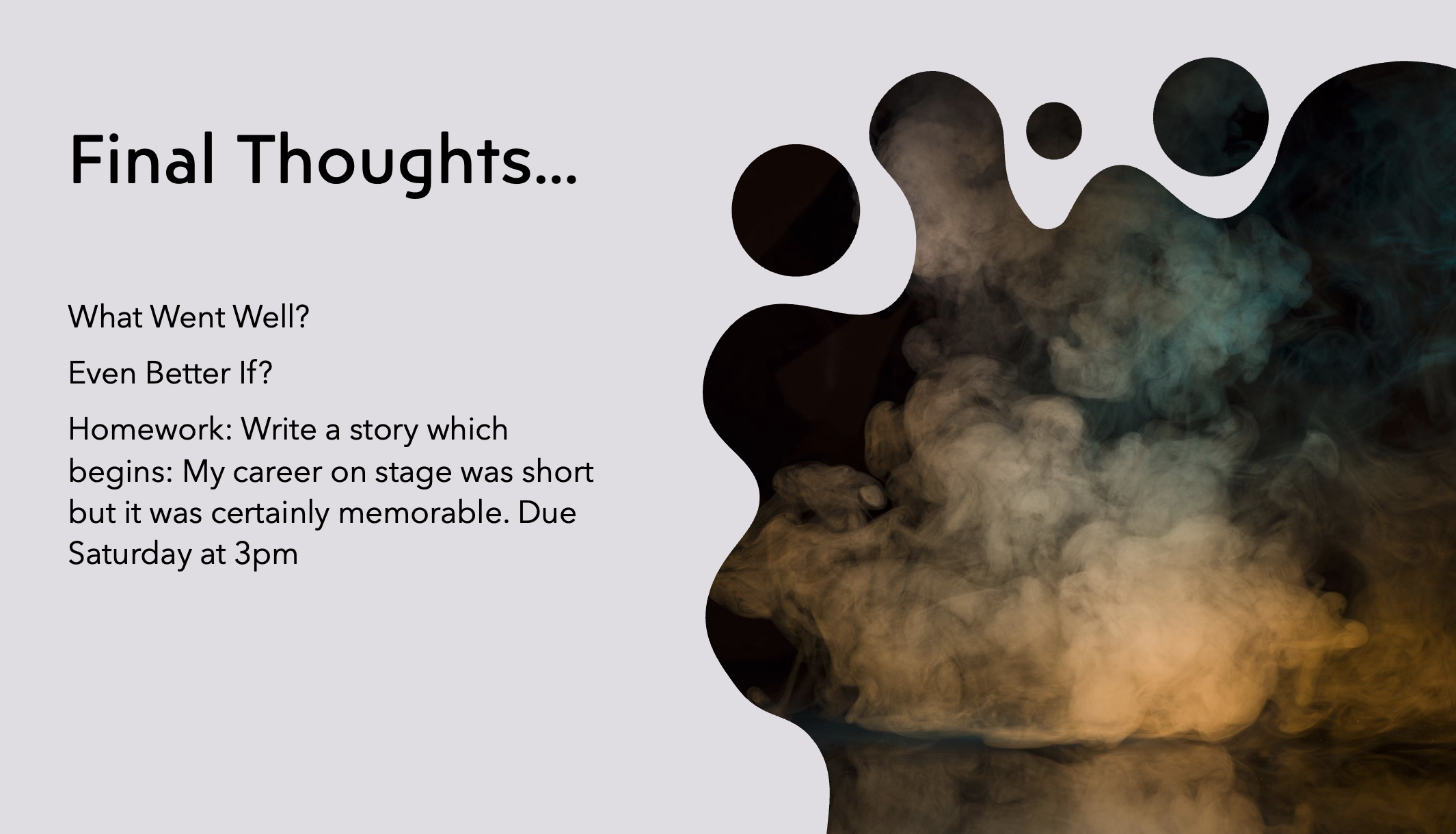
Attachments:
You must be logged in to view attached files. -
at 13:35 #40404
Beth
ParticipantSummary for Lesson 2
In today’s class we continued our work on first lines, last lines and continuation of story prompts, thinking about how to use genre to deal with boring prompts, how to take a prompt in an unexpected direction and how to work with another author’s characters. We discussed the importance of understanding a character’s motivations, expression, ability to change, etc., and looked at how using their mindset can be helpful. The class then completed some excellent group conversations workshopping their own GCSE-style prompts and coming together to talk through lots of great ideas for how to approach this question type. We finished by studying a few final writing techniques that the class can use to help with homework. Wonderful work today class, particularly with the group work which you completely beautifully. Keep up the great work 🙂
Shaelin writing tips video: https://www.youtube.com/watch?v=bBqT7KNLDsw&list=PL8-jsG6NG3oJsJ6LTZRtYtCHWi-5pjhQJ
Homework
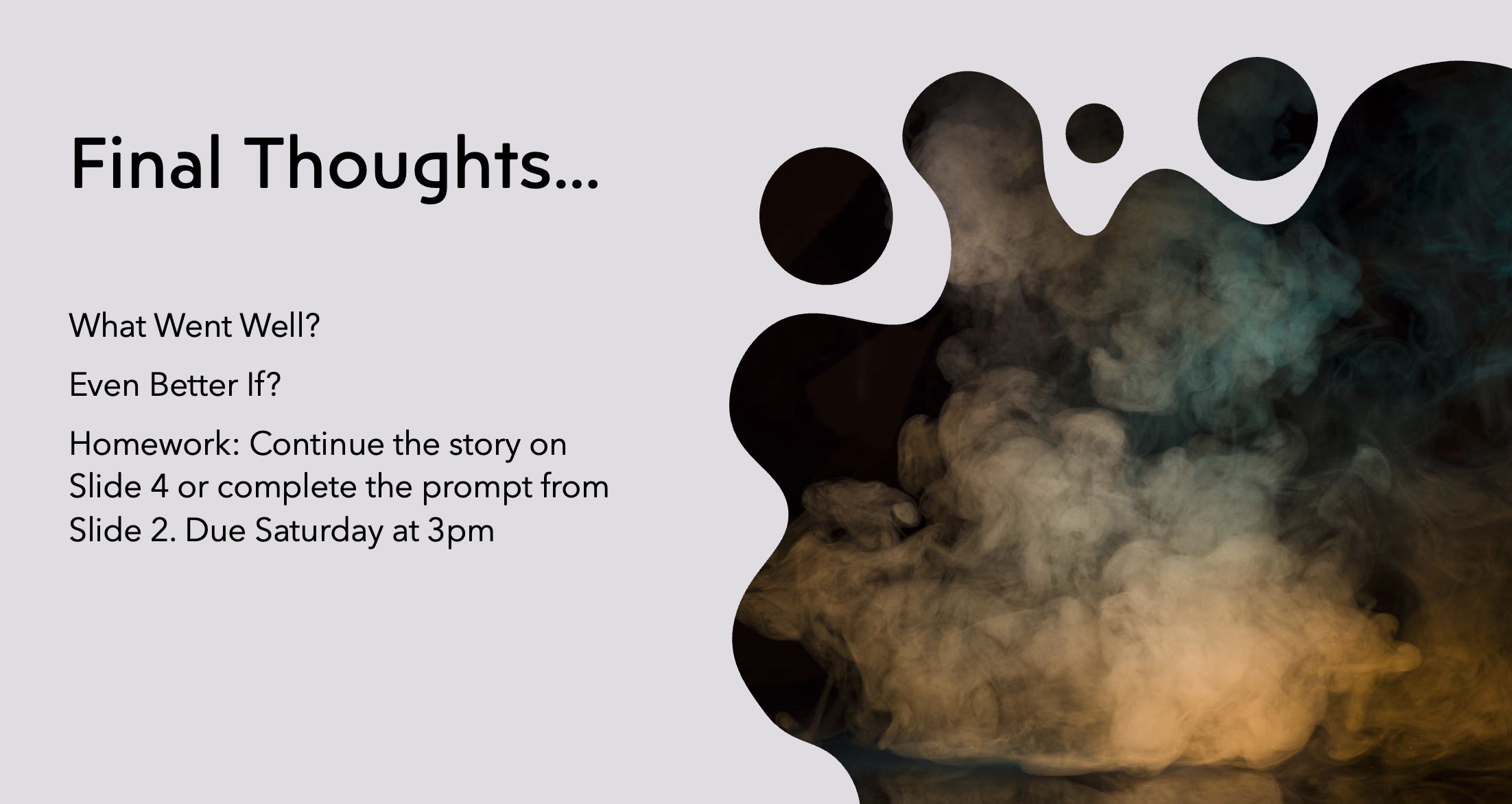
Attachments:
You must be logged in to view attached files. -
at 16:38 #40480
Jonathan
ParticipantLesson 2 Homework
Our long-lasting friendship originated from a tiny accident. In a regular afternoon back in my college days, I was sitting in a café, studying for the exam on the next day. Everything was perfectly regular: the taste of the coffee, the seat I took, and the view of the bustling road framed in the window; of course, the studying part was tedious as usual as well. After two hours of learning, my brain went on a strike. It felt like a rusty electronic component, who tried its best but just could not function anymore. I decided to reward myself a break. Putting on my headphones, the pressure of the upcoming exam was cancelled out along with the surrounding noises. For the first time in that day, I finally felt the liveliness resurrecting in me, who was no different than a skeleton, in the middle of the exhausting exam week. I moved my sight away from the computer screen – a great relief – and stretched it as far as I could over the horizon. I imagined going on a thrilling adventure over there, hiking on the mountains that were barely visible at the misty nightfall. I dreamed of everything, just to take my mind away from the miserable reality; but in the end, realizing my fate of never being able to enjoy the gorgeous evening, I could only sigh a few more times.
Suddenly, a ring of my phone interrupted my stream of thoughts. A unfamiliar name appeared on the screen. Thomas Miller? I searched through my lifetime of memories, even the most minor encounters, but the name did not came out. With curiosity and doubt, I opened the message. It read: “What’s up Jonathan, want to hang out tomorrow at 5:30PM? Let’s meet in Crescent Park.” I was confused: how did this guy know my name? I clicked into his profile page – seemed like a friendly person, but definitely not a familiar face. He must had a friend named Jonathan, but accidentally sent this message to me, I explained to myself. But the second question immediately arose: how did he know my address? The city I lived in did have a park named Crescent Park, which would not be a common name for parks. This person coincidentally lived in the same city as me!
Bizarrely, I began looking forward to meet this man named Thomas Miller. Maybe because of curiosity, maybe because of the stress of exams, maybe because of my lack of socializing… I was fascinated by this thought, and wished if I had the courage to accept the invitation. My rationality told me to politely decline and tell him that he messaged the wrong person. But before I finished pondering, I found a green bubble I just sent out on the screen – somehow, without realization, I already replied to him, agreeing to his invitation! It seemed that my hand had subconsciously typed out my inner thoughts, as I looked forward to meet this person, when I saw the message at first. Oddly, I did not panic, nor did I tried to recall the message. A part of me even felt satisfied of agreeing to this, as if I had been waiting for an unknown adventure like this to happen in my dull life for a long time. “Well, what could go wrong?” I silently said to myself. I decided to get on with it.
-
at 13:11 #40588
-
-
at 21:02 #40833
Beth
ParticipantSummary for Lesson 3
In today’s class we continued our work on GCSE writing, thinking today about picture stimuli and how to approach them. We began with talking about a writing exercise to help with thinking creatively about writing, before learning about stimuli and how these prompts appear in an exam context. We then spoke about how characters can be used as a way to respond to this before moving on to creating characters based on images. Finally we spoke about the photographic lens and how it can be used in writing. Great ideas today class, well done for your thoughts on the way stimuli can be both beneficial and constraining and for working out how to use characterization etc. to get around that. Keep up the fab work and see you next week 🙂
Homework

Attachments:
You must be logged in to view attached files. -
at 15:11 #40995
Beth
ParticipantSummary for Lesson 4
In today’s class we continued our work on stimuli writing, thinking today about utilising stimuli such as video and music. We began by reading an article on photography and creative writing, before thinking about using a short film as a stimulus to write from which the class did very well, producing some incredible ideas. We discussed this process and thought about specificity in writing. Finally the class created their own stimuli to write from, drawing on many different types very well to create interesting narratives exploring a host of themes, from modernity to identity to our place in the world. Excellent work everyone- very impressive focus and concentration. Keep it up! 🙂
Homework
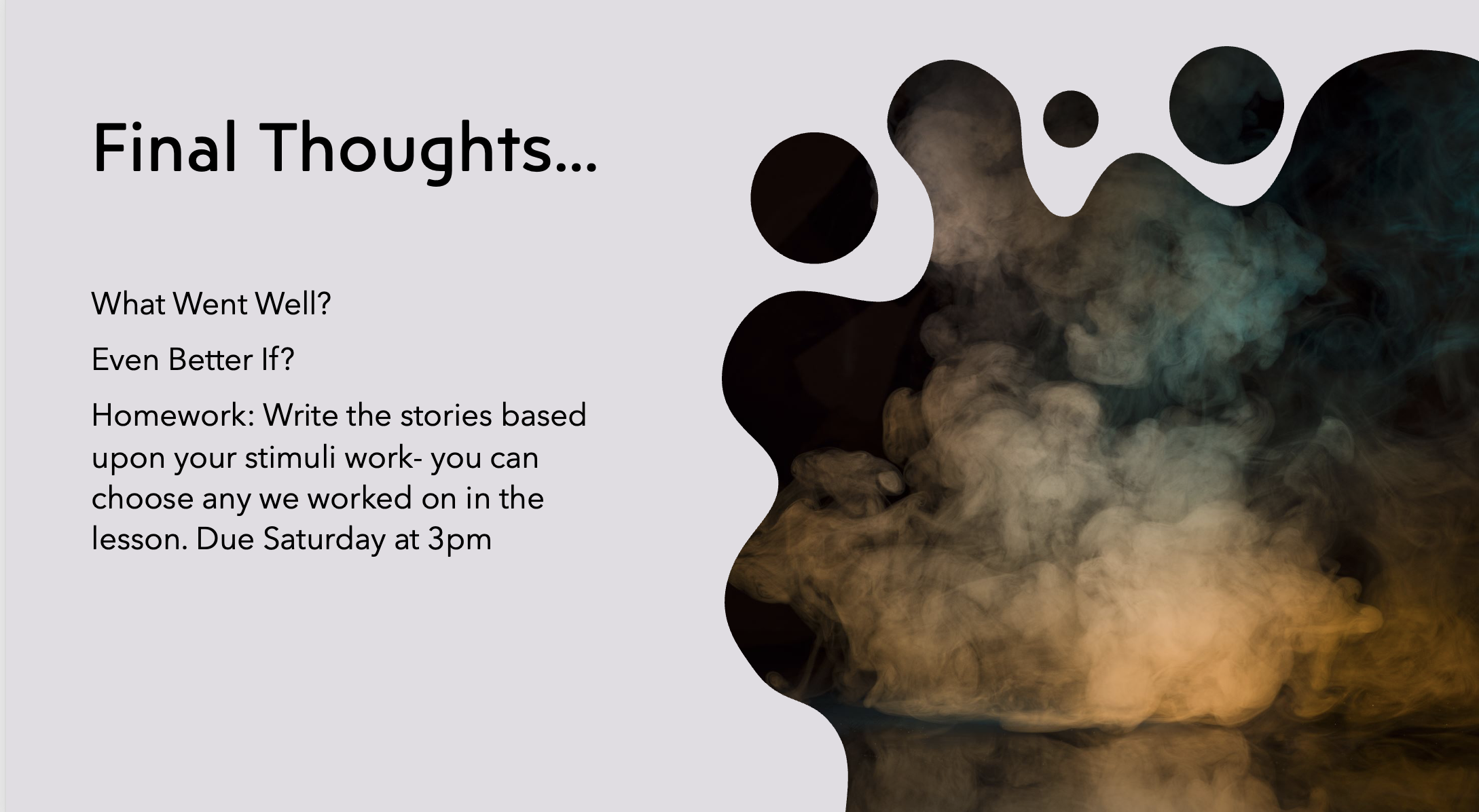
Attachments:
You must be logged in to view attached files. -
at 13:25 #41156
Beth
ParticipantSummary for Lesson 5
In today’s class we completed our mock which the class did fantastically, thinking about utilising all we have studied regarding stimuli-based questions and first-line-based questions. Great work and concentration everyone, remember to post mocks below and see you next week 🙂
Homework

Attachments:
You must be logged in to view attached files. -
at 13:27 #41158
Jonathan
ParticipantLesson 5 Mock Exam
Bare concrete walls, faded plastic chair, pieces of shattered furniture on the ground… Nothing could survive this fire – even nobody. I unrolled the newspaper in my hand. The headline read: “Family of Five Oddly Disappeared in Fire”. 13 years ago, this house went up in flames and was burnt to ashes, as well as the entire family’s whereabouts. Neither of their corpse, ashes, footprints, or anything was found. No one, even the gossipiest newspapers, knew any information about the family. All we knew, was they were the Sodder family.
For a split-second, my sight was blurred by the eerie, overwhelming information. I pulled myself back into my surroundings, and the first thing came to sight was a giant tunnel in the wall. It was truly a disaster when I peeked inside: dust forming a layer of skin on the tunnel wall, piles of broken pieces of wood blocking my vision, especially when there was nothing to look through – the tunnel seemed endless, extended to infinity, where sunlight couldn’t reach.
This had raised my suspicion. Could this be where the Sodder family escaped to? But for such an obvious possibility, how could the police investigators never have thought of it? Or… they chose to keep silent about it?
With this in mind, I decided to hop into this bottomless pit of mystery. As a retired agent, I would never hesitate to relive my adventurous career. When the police abruptly closed the case 9 years ago, I knew something was wrong. When I worked with the police and the FBI, this was not their style of acting. After 4 years of investigation, you were telling me the family of five died of the fire, with absolutely no traces? This didn’t sound like a reasonable inference of what happened. Who were these people?
Little did I know, these questions would just form more and more in my head, as I dug deeper into the mystery of the Sodder family…
-
at 16:42 #41247
-
-
at 14:51 #41161
SofiaL
Participanthere is my mock
it is attached below
thanks for the lesson
Attachments:
You must be logged in to view attached files.-
at 17:05 #41251
-
-
at 13:26 #41403
Beth
ParticipantSummary for Lesson 6
In today’s class we began our GCSE writing course, beginning with the creative prompts that ask students to write a piece based on place and setting. We began with some metaphor work before moving on to thinking about setting in writing and what it communicates. We learned about how setting expresses worldview, and the class used a GCSE prompt to brainstorm their response to the question ‘describe a place from childhood’, drawing out evocative and emotive images. We then looked at a passage from a novel where setting is described in powerful terms with a keen sense of the character’s perspective, before finally speed-planning another setting-based question using a three-step structure of history, plot and character. Lovely and engaged work today guys- well done for all your beautiful pieces of writing and keep up the amazing use of figurative language too! Well done 🙂
Link to read to help with homework: https://www.helpingwritersbecomeauthors.com/make-your-setting-a-character-in-its-own-right/
Setting video: https://www.youtube.com/watch?v=omsbv-hbXiM&t=142s
Homework
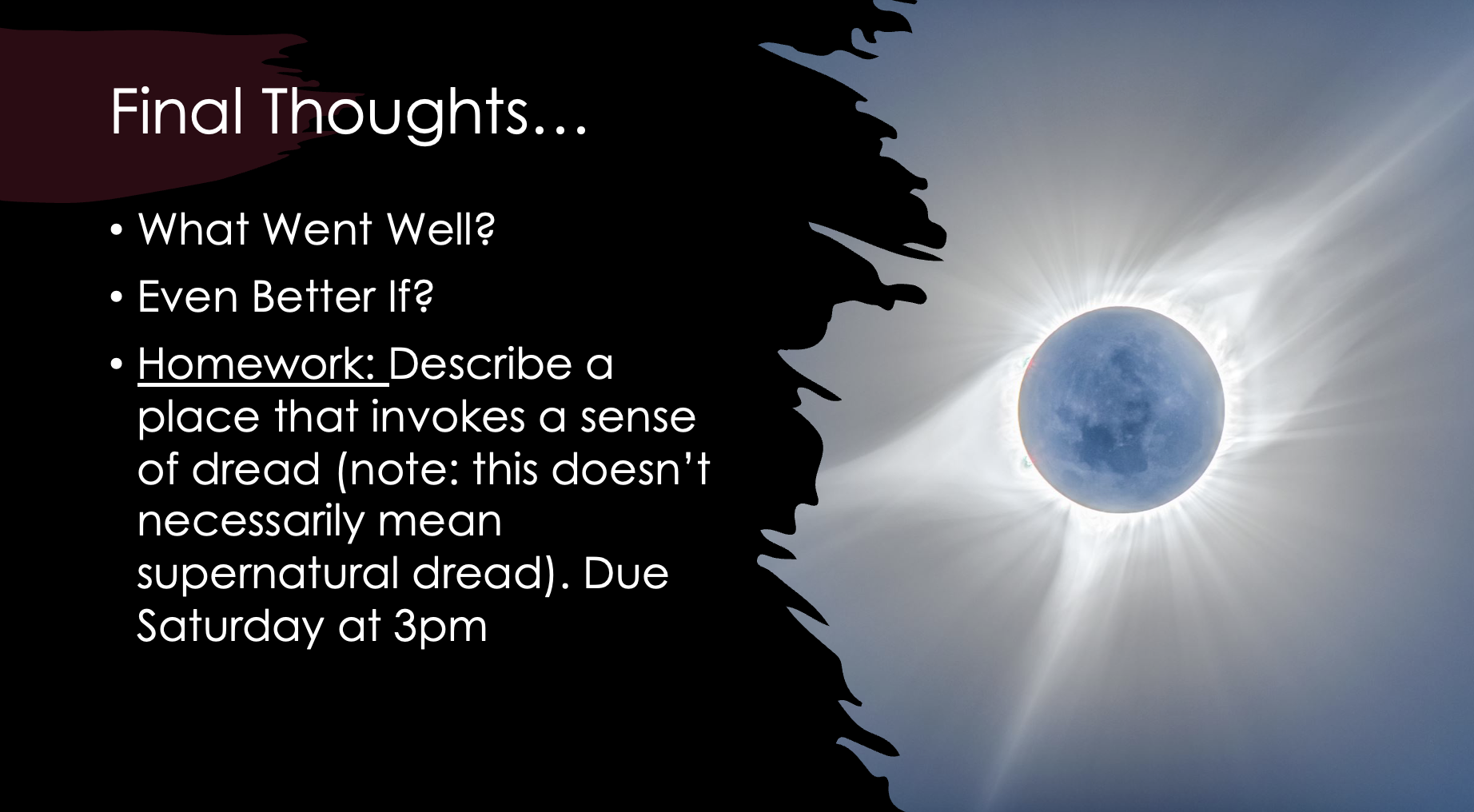
Attachments:
You must be logged in to view attached files. -
at 17:46 #41487
Beth
ParticipantSummary for Lesson 7
In today’s class we continued our writing course, thinking today about the importance of harnessing genre in exam writing. We started with a metaphor exercise before delving into the concept of genre and the students’ favourite genres to write in. We completed a task where the class had to combine genre with a past paper question in multiple different ways and then thought in depth about sci-fi and how it is constructed. We looked at sketching out some sci-fi prompts thinking about the difference between literary and genre fiction. Some great ideas today class, particularly when pulling apart your own relationship to genre and how you use it in your writing. Amazing job- keep up the wonderful ideas! 🙂
Genre video: https://www.youtube.com/watch?v=-foAoz3i98w
Past paper for homework: https://revisionworld.com/sites/revisionworld.com/files/imce/1EN0_01_que_20190605.pdf
Homework
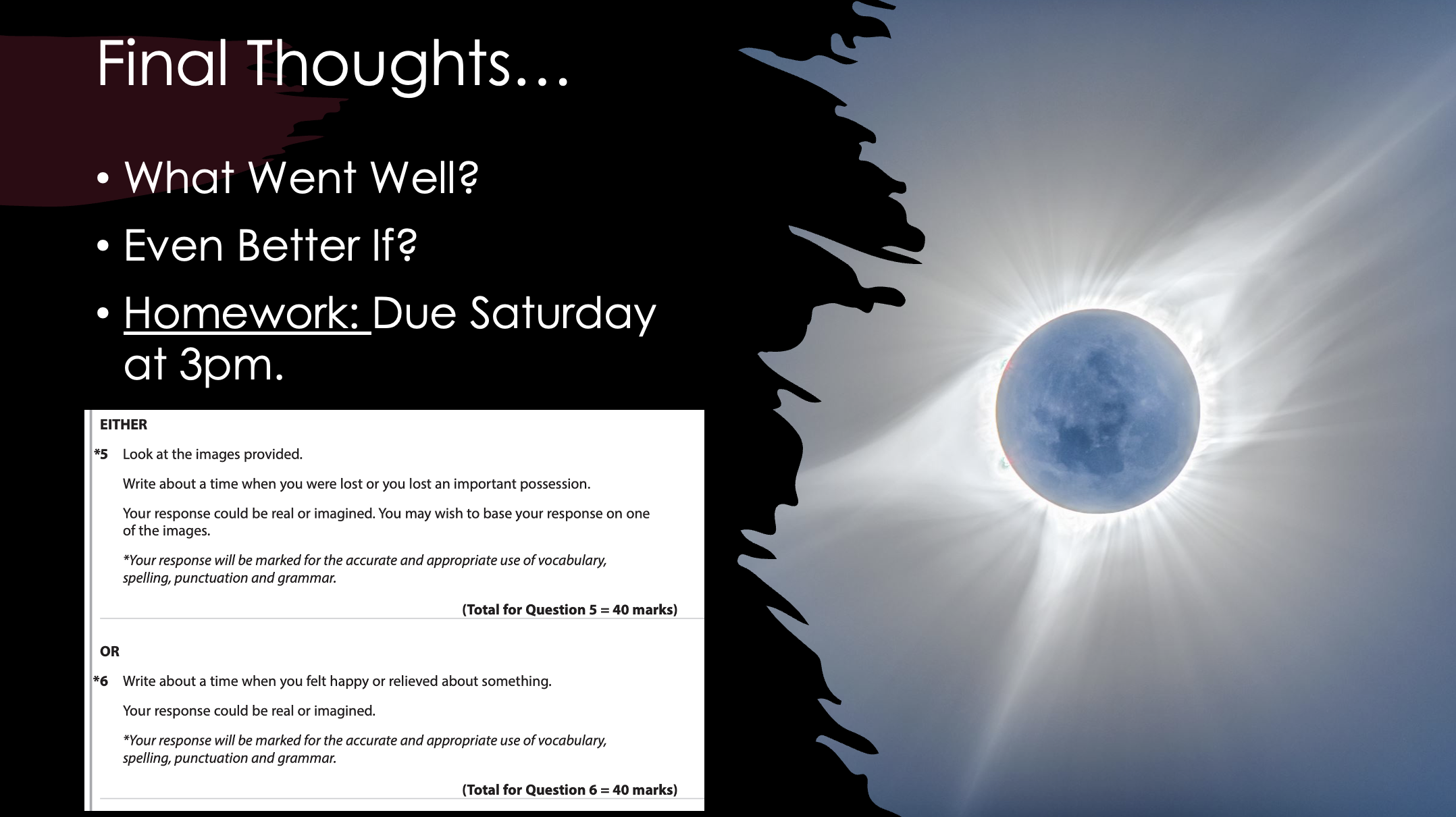
Attachments:
You must be logged in to view attached files. -
at 17:47 #42877
Beth
ParticipantSummary for Lesson 8
In today’s class we looked at both writing based upon image prompts and emotive writing. We looked at several skills to help the students think about using prompts, such as camera lens focus, unusual imagery, reflecting emotions outwardly. The class workshopped some writing using these skills and we looked at some examples of outstanding descriptive writing. We then looked at emotive writing and how to avoid melodrama- thinking about key ways to make feelings in creative writing ring true. Well done today everyone, the PPT is below. Your writing was exceptional today and I was very impressed by everyone you shared. Keep up the great work and see you next time 🙂
Emotive writing vid: https://www.youtube.com/watch?v=SKWc8v6IXAA&t=286s
Descriptive vid: https://www.youtube.com/watch?v=C58CjwJsCvY
Homework

Attachments:
You must be logged in to view attached files. -
at 13:38 #42885
Jonathan
ParticipantLesson 5 Mock Exam
(Paranoia Prompt)
As the wind stabbed into my bones, I laid back on my camping chair. The rain struck on the huge tent above my head; thin, but enough to protect a faint bonfire underneath. As the flame danced in the wind, I stared at my friend, Mack, who reached into a bag, his head almost diving into the bag as well.
Yes, I introduced him as my “friend”, but day by day, clusters of suspicion silently grew in me. Shoes soaked, stomach growling, but Mack was energized as ever, as if this predicament was all nothing but a fever dream of me! Date back to one week ago, Mack and I went on this camping trip. Days were ordinary, until Mack started blabbering about fishing in a random morning. Since then, he would disappear in the morning, and return with empty hands at night. But you should look at his appearance, face flushed, walking clumsily as if an entire watermelon was stuck in his belly! Rather conveniently, the way he was heading to was where a nearby pub was located at. Mack was a traitor! Chest inflated by the thoughts, I stood up, and walked towards him with the might a lion approaching its prey. But when Mack turned around I was left speechless, hating myself for my hideous thoughts.
He was holding a gigantic fish!
-
at 11:44 #42967
-
-
at 14:03 #42913
Beth
ParticipantSummary for Lesson 10
In today’s class we completed our course, thinking about emotive writing and completing a mock exam. We began by pulling on the work we had done last week before thinking in more depth about how to create complex emotive scenes whilst staying true to character. The class practiced figurative language and some key tips on how to create a compelling truth within emotive writing, and then in the second half of the lesson they completed their mock exams. Incredible work today everyone, well done for your focus and fantastic ideas throughout the class. Keep up the great work and have a lovely start to the school term! 🙂
Homework

Attachments:
You must be logged in to view attached files.
-
-
AuthorPosts
- You must be logged in to reply to this topic.
